- Featured Articles
- Financial Goals
- Financial Advice
- Estate Planning
- Tax Planning
- Credit Cards
- Saving For College
- Financial Calculators
- Finance Book Reviews
- Financial Scams and Fraud
- Financial Coach
- Affiliate Disclosure
- Privacy Policy
- Cookie Policy
- Contact Us Page

Napoleon Hill’s Think and Grow Rich Summary & Review
The top 12 best investing books for beginners in 2024, 6 books like rich dad poor dad you must read..., the simple path to wealth summary & book review (by..., rich dad poor dad review & summary – a life changing read.
We are audience supported - when you make a purchase through our site, we may earn an affiliate commission.
Have you ever wondered why some people seem to have a magic touch with money while others struggle? Robert Kiyosaki’s eye-opening book, Rich Dad Poor Dad , might just have the answers. Imagine learning secrets from someone who has mastered the game of wealth – that’s what this book offers!
Are you looking for a Rich Dad, Poor Dad summary and review from a retired financial planner?
In Rich Dad Poor Dad , Kiyosaki shares his journey of growing up with two dads – his real dad (the “Poor Dad”) and the father of his best friend (the “Rich Dad”). Each dad taught him different lessons about money, success, and life . But here’s the twist: the Rich Dad, despite not having a college degree, built a fortune, while the Poor Dad, highly educated, struggled financially.
This book isn’t just a story; it’s a treasure trove of lessons on financial literacy and wealth building . It challenges the traditional belief that working hard and earning a salary is the way to wealth. Instead, it opens your eyes to the importance of financial education, investing , and understanding the difference between assets and liabilities .

Buy Rich Dad, Poor Dad on Amazon Today!
Are you curious about how to make your money work for you, instead of you working for money? Do you want to know the secrets of passive income and financial freedom ? Then, you’re in the right place! This summary & review will dive deep into Kiyosaki’s teachings, unraveling the wisdom behind wealth accumulation and financial independence .
Key Takeaways From Reading The Book Rich Dad, Poor Dad
Reflecting on Robert Kiyosaki’s influential work, several key takeaways emerge that can fundamentally alter one’s financial trajectory:
- Asset vs. Liability Mindset : Understanding the difference between assets that put money in your pocket and liabilities that take it out is crucial. This book teaches the art of discerning and investing in income-generating assets.
- Breaking the Paycheck Cycle : Kiyosaki emphasizes the importance of moving beyond the paycheck-to-paycheck existence. He encourages readers to educate themselves on investment strategies and seek opportunities for financial growth.
- Practical Financial Education : The book is not just about theoretical knowledge; it provides practical steps and tools for individuals to actively take control of their financial future.
- Investment and Risk Management : Learning to invest wisely and manage risks is a key theme. The book guides readers through the nuances of strategic investment and the importance of financial literacy.
- Empowerment Through Knowledge : Ultimately, “Rich Dad Poor Dad” empowers readers with the knowledge to make informed financial decisions, paving the way for financial independence and success.
Quick Links – Rich Dad Poor Dad Review
Rich dad poor dad summary: a tale of 2 mindsets.

In this book, Robert Kiyosaki draws from his own life experiences with two father figures – his biological father (the ‘Poor Dad’) and the father of his best friend (the ‘Rich Dad’). These two men represent contrasting financial philosophies:
Imagine standing at a crossroads: one path leads to a luxurious mansion, the other to a modest home. This is the visual metaphor for the financial choices outlined in “Rich Dad Poor Dad.”
- Poor Dad : Advocates traditional financial wisdom – get a good education, work hard, save money, and retire.
- Rich Dad : Encourages financial education, investing in assets, and understanding how money works to create wealth.

Kiyosaki’s journey through these contrasting views offers profound insights into how we can elevate our financial health. The book is more than a collection of advice; it’s a series of lessons in financial intelligence, risk-taking, and strategic investment.
Memorable quotes throughout the book serve as guideposts, steering readers toward smarter financial decisions and independence. It’s a roadmap for anyone looking to transform their financial mindset and embark on a journey to wealth and financial freedom.
In my deep dive into Robert Kiyosaki’s groundbreaking book, I’ll unravel the transformative views on personal finance and wealth building that have challenged and changed millions of lives.

The Core Philosophy: Rich Dad vs. Poor Dad
At the heart of Kiyosaki’s narrative is a stark contrast between two financial philosophies.
- The ‘Poor Dad,’ embodying a conservative, traditional approach, believes in the security of a regular job and a steady paycheck.
- In contrast, the ‘Rich Dad’ represents an entrepreneurial spirit, advocating for investing in assets and building wealth through savvy financial decisions.
Reshaping Our Financial Understanding
Kiyosaki doesn’t just narrate two different life paths; he looks into the psyche behind them. He urges readers to prioritize financial literacy , understanding the nuances of assets and liabilities, and the importance of making money work for you.
This book isn’t just about choosing between two paths; it’s about understanding the rules of the financial game and how to play it effectively.
“The rich think long term, the poor think short term.” Quotes from Rich Dad Poor Dad
The True Meaning of Wealth
One of the most striking revelations in “Rich Dad Poor Dad” is the redefinition of wealth. Kiyosaki argues that true wealth isn’t about earning a high salary; it’s about building and owning assets that generate income, even when you’re not actively working.
This paradigm shift from working for money to having money work for you is a game-changer.
The Financial Mindset Shift
Ultimately, Kiyosaki’s book is a call to action. It’s about adopting a mindset that embraces informed risk-taking, understands the power of investment, and sees beyond the traditional paycheck-to-paycheck living. This shift in mindset is what separates the financially successful from those who struggle.
- In ‘Rich Dad Poor Dad,’ Kiyosaki provides a compelling comparison between two distinct financial philosophies, each shaped by his own ‘dads.’
- The book encapsulates essential insights on how to elevate one’s financial health by shifting focus from merely earning to intelligently investing and creating assets.
- It’s peppered with memorable quotes that encapsulate the essence of Kiyosaki’s financial wisdom, serving as mental signposts guiding readers toward fiscal prudence and independence.
Buy a Copy of The Book On Amazon Now !!
TRY AN AUDIBLE TRIAL MEMBERSHIP FOR FREE!!
GET TWO FREE AUDIBOOKS, 30 days for free $14.95 after 30 days and cancel at anytime!! Visit Amazon.com and sign up no – CLICK BELOW
Essential Book Insights: Discovering Financial Wisdom Through Two Fathers

What I Learned from “Rich Dad Poor Dad”
“The rich don’t work for money. The poor do.” Quotes From Rich Dad Poor Dad
- Be Smart with Money : The book tells us that it’s not just about how much money you make, but how you use it. It’s important to know the difference between things that make you money (assets) and things that cost you money (liabilities).
- Think About the Future : Instead of just working for money, think about how to make money work for you. This means learning about things like investing and starting a business.
- Learn About Money : School teaches us a lot, but not always about money. This book shows that learning about money is really important for everyone.
- Take Chances : Sometimes, to make money, you have to take risks. But these should be smart risks, where you’ve thought about what could happen.
- Work Hard, But Smart : It’s not just about working hard at a job. It’s also about working smart, like finding ways to make extra money without always having to do more work.
Why This Book is Important
“Rich Dad Poor Dad” is a great book because it makes us think differently about money. It tells us that anyone can learn to be better with money, and that it’s important to start learning early. This book is like a guide to help us make smart choices with our money.
“rich People buy assets, the poor only have expenses.” Quotes From Rich Dad Poor Dad
10 lessons from Rich Dad Por Dad
Book Review of Rich Dad Poor Dad

The Story’s Core:
“Rich Dad Poor Dad” is more than just a book; it’s a journey through contrasting financial ideologies. Kiyosaki’s narrative, rooted in his experiences with two father figures, offers a unique perspective on wealth and money management. The ‘poor dad,’ his biological father, represents traditional financial beliefs, while the ‘rich dad,’ a mentor, embodies a more progressive, investment-focused approach.
Author’s Background: The Credibility Factor
Robert Kiyosaki’s background as an entrepreneur and educator in finance adds depth and authenticity to his teachings. His real-life experiences and dual roles provide a practical and relatable approach to financial education, making complex concepts accessible to a broad audience.
Why This Book Matters
“Rich Dad Poor Dad” isn’t just a guide; it’s a transformative experience. It challenges deep-seated beliefs about money and employment, urging readers to adopt a proactive approach to wealth creation. The book’s emphasis on financial literacy and independence is not just educational but a call to action for personal financial revolution.
My Personal Takeaway
As a reader, “Rich Dad Poor Dad” has been a revelation. The book’s lessons on the distinction between assets and liabilities, and the importance of financial literacy, have reshaped my understanding of wealth and financial strategy. Kiyosaki’s approach to earning and investing is a wake-up call to rethink traditional financial paths.
The Impact: Unlocking Financial Wisdom
This book is a key to unlocking financial wisdom. It’s not just about accumulating wealth; it’s about fostering a mindset that prioritizes financial education and smart investing. Kiyosaki’s straightforward explanation of complex financial concepts makes the book an invaluable resource for anyone on the path to financial freedom.
Recommendation
I highly recommend “Rich Dad Poor Dad” to anyone looking to enhance their financial understanding and embark on a journey toward economic empowerment. It’s a must-read for those seeking practical wisdom and strategies for wealth-building in today’s world.
Book Advantages & Drawbacks

Many aspects of ‘Rich Dad Poor Dad’ have significantly influenced my approach to financial literacy, yet some elements of the book may not resonate with every reader. The Advantages of the book are substantial, offering a fresh perspective on money that challenges conventional wisdom.
However, the Drawbacks of the book, such as the one-size-fits-all approach, might not suit everyone’s individual financial situation.
Analyzing the book through this lens, it’s clear that while it’s a powerful tool for financial awakening, it’s not without its limitations.
Diverse Perspectives: A Community’s Take on Kiyosaki’s Teachings

Don’t just take my word for it. I have also consolidated other viewpoints about the book for you as well…
A Balanced Look: Reviews from Book Rating Websites
The reviews on various book rating websites present a kaleidoscope of opinions on “Rich Dad Poor Dad.” Many readers applaud the book for its clear and impactful insights into financial literacy and wealth-building. They appreciate Kiyosaki’s knack for simplifying complex financial concepts, making them accessible to a broad audience.
Quotes from the book, like “The rich see opportunities, the poor see obstacles,” resonate with many, encapsulating the essence of Kiyosaki’s philosophy.
However, some reviews offer a counterpoint, critiquing the book for its seemingly oversimplified approach to complex financial systems. Despite these differing views, the book is widely recognized as a thought-provoking piece that encourages readers to reassess their financial strategies.
“The rich see opportunities, the poor see obstacles.” Quotes from Rich Dad Poor Dad
Amazon & Reddit’s Candid Opinions
Here’s a table summarizing the diverse opinions from book rating websites, Amazon customer feedback, and Reddit discussions on “Rich Dad Poor Dad”:
This table provides a balanced overview of the varying perspectives on “Rich Dad Poor Dad,” highlighting its impact and the discussions it has sparked in different communities.
Despite these disparities, the consensus acknowledges the book as an eye-opener, stirring readers to reevaluate their financial strategies and prioritize the growth of assets over mere income.
Similar Books To Read
Beyond the insights gleaned from Amazon and Reddit, I’m eager to explore books similar to ‘Rich Dad Poor Dad’ that have also challenged and reshaped others’ financial perspectives. When seeking similar book recommendations, I look for those that offer a blend of transformative ideas and practicable advice for implementing financial strategies.
If you are interested in this book, you may want to check out the Best Books Like Rich Dad Poor Dad as well.
- ‘The Millionaire Next Door’ by Thomas J. Stanley and William D. Danko : This book delves into the common traits of those who’ve accumulated wealth, emphasizing frugality and smart investing.
- Think and Grow Rich by Napoleon Hill : A classic that explores the psychological power of thought in achieving personal wealth.
- The Richest Man in Babylon by George S. Clason It offers timeless parables about the fundamentals of saving, investing, and financial planning.
- The Millionaire Fastlane by MJ DeMarco
- The Millionaire Mindset by Gerry Robert
- The Cashflow Quadrant by Robert Kiyosaki
- The 7 Habits of Highly Effective People by Stephen Covey
Summarizing the Key Insights:
In wrapping up this insightful journey through the realms of personal finance, let’s revisit the essential nuggets of wisdom we’ve unearthed. Our exploration has not only equipped us with practical advice but also instilled a sense of empowerment in our financial decision-making.
- Financial Literacy: The cornerstone of our discussion, understanding the nuances of assets and liabilities, is pivotal. It’s not just about earning; it’s about making your earnings work for you.
- Investment Strategies: We looked into the art of investing wisely, emphasizing the importance of informed risk-taking and strategic financial planning.
- Breaking the Paycheck Cycle: We underscored the significance of transcending the paycheck-to-paycheck lifestyle, advocating for a proactive approach to wealth accumulation.
As someone who has navigated the complexities of financial planning, I can attest to the transformative power of these principles. They are not just theories but practical tools that can lead to a more secure and prosperous future.
What’s your biggest financial goal, and how do you plan to achieve it? Is it financial literacy , investment strategies , and wealth accumulation ? Share your thoughts and join the conversation below. Your insights could be the catalyst for someone else’s financial breakthrough.
Embarking on your journey to financial literacy and independence can be the most rewarding decision of your life. Remember, it’s not just about wealth accumulation; it’s about creating a life of financial freedom and security.
Are you ready to take control of your financial future? I encourage you to subscribe to our newsletter for more insights, or schedule a consultation to personalize your financial journey. Your path to financial freedom starts here.
- Sharing the article with your friends on social media – and like and follow us there as well.
- Sign up for the FREE personal finance newsletter, and never miss anything again.
- Take a look around the site for other articles that you may enjoy.
Note: The content provided in this article is for informational purposes only and should not be considered as financial or legal advice. Consult with a professional advisor or accountant for personalized guidance.
The book is 336 pages. Created by Robert Kiyosaki, “Rich Dad Poor Dad” is a book that stresses the importance of financial literacy and teaches the reader how to acquire and use wealth. The book sold over 32 million copies and has been translated into over 51 languages. If you do nto want to read the book – consider listening to the audiobook of Rich Dad Poor Dad.
While some may find Kiyosaki’s views controversial, “rich dad poor dad” is an interesting and thought-provoking read. There are many different ways to view success. In “rich dad poor dad” by Robert Kiyosaki, he looks at success through the lens of wealth. Kiyosaki argues that the traditional mindset of going to school, getting good grades, and finding a stable job is not the best path to riches. Instead, he advocates for taking risks, starting businesses, and investing in assets.
The answer is yes and no. The details are embellished, but the overall story is mostly true. In the book, “Rich Dad Poor Dad”, author Robert Kiyosaki talks about his two father figures – his birth father and his best friend’s father. He paints a picture of growing up with two completely different types of dads. His birth father was a highly educated man who worked hard for his family, but was never able to get ahead financially. On the other hand, his best friend’s father was a self-made millionaire who always seemed to have money to spare. Kiyosaki uses his experience growing up with these two very different men to explain some basic principles of financial success. So, is “Rich Dad Poor Dad” a true story? While the book is based on Kiyosaki’s own life, some of the details have been changed or embellished in order to make a more compelling story. However, the overall message – that financial success is more about mindset than anything else – is true. If you’re looking for a true story about growing up with two very different father figures, this book is definitely worth a read.
The book rich dad poor dad is written by Robert Kiyosaki. It is a story about his two dads, one rich and one poor, and the lessons he learned from them about money.
In 1974, two young men graduated from the same college, in the same month, and with the same degree. They both had plans to become rich. One was my rich dad and the other was my poor dad. This is a story about two fathers, one rich and one poor, and the different lessons they taught their sons about money. Robert Kiyosaki, the author, grew up with two very different role models for money and success. His rich dad was a successful businessman who taught him the importance of investing and creating passive income. His poor dad was a well-educated government employee who taught him the importance of working hard and saving his money. Kiyosaki argues that the rich dad’s lessons were more valuable and have helped him become more successful than his poor dad.
Rich Dad Poor Dad is a book that tells a different story. It is the story of Robert Kiyosaki and his two fathers – his real father (poor dad) and the father of his best friend (rich dad). Kiyosaki found that his rich dad’s advice led to a life of financial freedom, while his poor dad’s advice left him struggling to make ends meet. The book has four main lessons: 1. You must learn to work to make money, not the other way around. 2. Your primary purpose in life should be to acquire assets, not to acquire liabilities. 3. The rich focus on opportunities, not on jobs. 4. The rich know that time, not money, is their most important asset. Rich Dad Poor Dad is a book that advocates financial independence through asset acquisition. The book provides four main lessons on how to acquire assets, how to think about work, and the role of time in building wealth.
Green Bond Principles & Initiatives: Sustainable Investing Opportunity of a Lifetime
Can you live on $4,000 a month in retirement exploring financial feasibility, how to save money fast 54 insanely effective ways to save money in 2024, taz credit card review: pros, cons, and taz visa alternatives, how can you combine visa gift cards into one visa gift card, how to avoid lifestyle creep: smart strategies for 2024.
- Book Review
- Robert kiyosaki
- Customer Service Page
A former Financial Planner looking to help more people make their finances easier, with Financial Coaching
Contact Details: [email protected] or (917) 426-2352
Does Chime Have & Work With Zelle? Yes, Let Me Show You How
Vanilla gift card zip code not working find out what to do, 💰 does chime work with cash app learn how to link them and send money.
© 2024 Michaelryanmoney.com. All Rights Reserved.

- Explore Properties
- Agents & Brokers
- Sell Your Property
- Track with Stessa
- Screen with RentPrep
- Investor Services
- Investment Solutions
- News & Press
- Browse Properties
Rich Dad Poor Dad - a quick book summary and review

Robert Kiyosaki’s Rich Dad Poor Dad was first published in 1997 and quickly became a must-read for people interested in investing, money, and the global economy. The book has been translated into dozens of languages, sold around the world, and has become the #1 personal finance book of all time.
The overarching theme of Rich Dad Poor Dad is how to use money as a tool for wealth development.
It destroys the myth that the rich are born rich, explains why your personal residence may not really be an asset, describes the real difference between an asset and a liability, and much more.
Key takeaways/lessons learned
- Six lessons Robert Kiyosaki learned from his Rich Dad about making money and the mistakes that Poor Dad made
- Five obstacles to overcome before you can become rich and stay rich
- Ten steps to follow to develop your financial genius
- Actionable to-do steps you can put to work right away
Chapter/Section Summaries
Rich Dad Poor Dad contains a total of 10 chapters plus the introduction, but much of the book is focused on the first 6 parts or lessons.
We’ll cover the introduction and the first 6 lessons, then the remaining 4 sections later in this review.
- Introduction: Rich Dad Poor Dad
- Chapter 1: The Rich Don’t Work for Money
- Chapter 2: Why Teach Financial Literacy?
- Chapter 3: Mind Your Own Business
- Chapter 4: The History of Taxes and the Power of Corporations
- Chapter 5: The Rich Invent Money
- Chapter 6: Work to Learn – Don’t Work for Money
Introduction
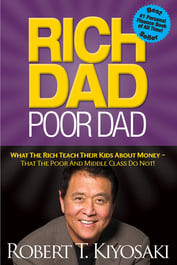
Poor Dad was Kiyosaki’s biological father, a man who was highly intelligent and very well educated. Poor Dad believed in studying hard and getting good grades, then finding a well-paying job. Yet, despite these seemingly positive attributes, Poor Dad didn’t do well financially.
Rich Dad was the father of Kiyosaki’s best friend. He had a similar work ethic to Kiyosaki’s real dad, but with a twist. Rich Dad believed in financial education, learning how money works, and understanding how to make money work for you. Although he was an eighth-grade dropout, Rich Dad eventually became a millionaire by putting the power of money to work for him.
The book is written from Kiyosaki’s perspective of how Rich Dad went about making money and the mistakes that Poor Dad made. The first 6 chapters of Rich Dad Poor Dad make up about two-thirds of the book and discuss the 6 lessons that Kiyosaki learned from his Rich Dad.
Chapter 1: The rich don’t work for money
Oftentimes people misunderstand the title of this chapter, and mistakenly believe that it means the rich don’t work. In fact, the complete opposite is true.
Instead of reading the chapter title as “The Rich Don’t Work for Money”, what Kiyosaki means to say is that “The Rich Don’t Work for Money. ” Note that by putting the emphasis on the word “money,” this section takes on an entirely different meaning.
The truth is that the majority of rich people do work very hard, but they go about it differently than most people do. Rich people—and people who want to become rich—work and learn every day how to put money to work for them. As Rich Dad says, “The poor and middle class work for money. The rich have money work for them.”
Kiyosaki also notes that having a regular job is just a short-term solution to the long-term problem (or challenge) of creating wealth and financial freedom:
“It’s fear that keeps most people working at a job: the fear of not paying their bills, the fear of being fired, the fear of not having enough money, and the fear of starting over. That’s the price of studying to learn a profession or trade, and then working for money. Most people become a slave to money—and then get angry at their boss.”

Chapter 2: Why teach financial literacy?
The second chapter of Rich Dad Poor Dad explains the difference between an asset and a liability. Chapter 2 drives home the point that it’s not about how much money you make, but about how much money you keep.
An asset is something that has value, that produces income or appreciates, and has a market where the asset can easily be bought and sold:
- Assets produce income
- Assets appreciate
- Assets do both
Conversely, liabilities take money out of your pocket because of the costs associated with them. When Rich Dad Poor Dad was first published back in 1997, Kiyosaki created a lot of controversy with this statement.
That’s because by definition, a personal residence isn’t an asset unless it appreciates enough to offset the costs of ownership. On the other hand, rental property is an asset because it can generate enough passive income to exceed the expenses of operating and financing the real estate.
As Kiyosaki writes in Chapter 2 of Rich Dad Poor Dad , “Want to grow rich? Concentrate your efforts on buying income-producing assets – when you truly understand what an asset is. Keep liabilities and expenses low. You’ll deepen your asset column.”
Chapter 3: Mind your own business
There are 2 key messages in this chapter.
- First, pay off your debts and start investing in income-producing assets as soon as possible.
- Next, stay financially healthy by spending your time (instead of your paycheck) and investing as much of your money as possible in assets.
Kiyosaki notes in Chapter 3 of Rich Dad Poor Dad that most people confuse their profession with their business. In other words, they spend their entire lives working in somebody else’s business and making other people rich.
One of my favorite quotes from this section is:
“The primary reason the majority of the poor and middle class are fiscally conservative is that they have no financial foundation. They have to cling to their jobs and play it safe. They can’t afford to take risks.”

Chapter 4: The history of taxes and the power of corporations
When reading this chapter, it’s important to keep in mind that Kiyosaki wrote Rich Dad Poor Dad as a motivational book, not to provide expert financial or tax advice.
For example, Kiyosaki writes about the time he bought a Porsche and treated it as a business expense, using before-tax dollars. Buying a high-end luxury car when a much less expensive make and model would do could put an investor on the fast track to an IRS audit.
But putting the Porsche aside, the points made in this chapter discuss how to play the investment game smart. The rich understand the power of company structures and the tax code and use every legal means they can to minimize their tax burden.
Compare how business owners and investors with corporations such as C corps, S corps, or LLCs pay taxes to how most people pay tax:
Business owners with a corporate structure:
Employees who work for corporations:
Notice that employees who work for somebody else spend their money post-tax, while business owners earn and spend before paying tax.
Chapter 4 of the book also covers the 4 main components of what Kiyosaki calls “Financial IQ”: Accounting, Investment Strategy, Market Law, and Law.
As Rich Dad Poor Dad reminds us, understanding the legal and tax advantages significantly contribute to building long-term wealth:
“For instance, a corporation can pay expenses before paying taxes, whereas an employee gets taxed first and must try to pay expenses on what is left. . . Corporations also offer legal protection from lawsuits. When someone sues a wealthy individual, they are often met with layers of legal protection and often find that the wealthy person actually owns nothing [in their own name]. They control everything, but [personally] own nothing.”
Chapter 5: The rich invent money
Inventing money means finding opportunities or deals that other people don’t have the skill, knowledge, resources, or contacts for.
In Chapter 5, Rich Dad Poor Dad explains there are 2 types of investors:
- Investment packages are bought by people who entrust their money to a developer or fund manager. This is the way that most people invest, such as buying shares of an ETF or putting money into a real estate crowdfunding venture.
- Professional investors look after their own investments, research the market to find deals that make sense , then hire professionals to manage the daily oversight. Professional investors have 3 things in common:
- Identify opportunities that other people have not found
- Raise funds for investment
- Work with other intelligent people
Here’s one of my favorite closing thoughts from this chapter:
“Some people argue that there aren’t real estate bargains where they are, but there are prime opportunities everywhere that are overlooked. Most people aren’t trained financially to recognize the opportunities in front of them.”
Chapter 6: Work to learn—don’t work for money
Poor Dad was intelligent and well educated and worked for money because job security meant everything to him. Rich Dad became a millionaire by working to learn.
As Kiyosaki writes:
“I recommend to young people to seek work for what they will learn, more than what they will earn. Look down the road at what skills they want to acquire before choosing a specific profession and before getting trapped in the Rat Race.”
In fact, that’s exactly what Kiyosaki did. He joined the Marines after graduating from college and learned the essential business skills of leading and managing people. After serving his country, Kiyosaki joined Xerox, overcame his fear of rejection to become one of the top 5 salespeople in the company, then left the corporate world to form his own business.
Chapter 6 of Rich Dad Poor Dad then discusses the synergy of management skills needed for success in business:
- Cash flow management
- Systems management
- People management

Overcoming Obstacles
Chapter 7 of Rich Dad Poor Dad begins by noting that “the primary difference between a rich person and a poor person is how they manage fear.”
Robert Kiyosaki isn’t talking about the type of fear that some people have when going to the dentist or watching The Exorcist . In the book, “fear” is about the fear of losing money and how to handle that fear.
It’s one of the 5 biggest obstacles people face on the path to becoming financially independent:
These roadblocks—and the failure to overcome them—are why people who have studied and achieved financial literacy are still unable to develop assets that generate plentiful amounts of cash flow.
Losing money is a fact of investing life, and so is the fear that comes along with it. Kiyosaki notes that he’s never met a rich person who has never lost money, but he’s met plenty of poor people who have never lost a dime because they’ve never invested .
Real estate investors who choose to act only on a “sure thing” are paralyzed by fear in disguise. People who can’t see the big picture and think big are the ones who almost never, ever succeed in investing or in life.
Everybody has doubts that affect self-confidence, and it’s easy to fall into the trap of playing “What if?” especially when friends and family are constantly reminding you of your potential shortcomings.
Things like the economy crashing, interest rates rising, and tenants not paying their rent are common “what if” fears that all real estate investors have. While these are important items to consider, it’s important not to allow the cynicism of others to overtake your control. Otherwise, you may become immobilized as opportunities pass you by.
In today’s interconnected world it’s easy to confuse being busy with actually accomplishing things that matter. In fact, according to Rich Dad Poor Dad , busy people are often the most lazy.
Busy people arrive at the office early and leave late. They bring work home to finish at night and on the weekends. Before they know it, the people and things that matter most to them have disappeared.
Instead of giving in to the call of the rat race and mistaking action for accomplishment, successful real estate investors are proactive and take care of themselves and their wealth first.
Habits control behavior. For example, most people pay their bills first before they pay themselves. The result is that there’s usually very little left over at the end of the month for investing.
Paying yourself first—even if you don’t have enough money to pay other people—makes you financially stronger, mentally and fiscally. In a way, it’s a form of reverse psychology.
When you develop the habit of paying yourself first, you become motivated by the fear of not being able to pay creditors. In turn, you begin looking for other forms of income like investment real estate.
Investors know what makes them money. But it’s the things they don’t know—and don’t know they don’t know—that makes them lose money. When people become truly arrogant, they honestly believe that what they don’t know doesn’t matter.
Train yourself to listen to what other people have to say, especially when it comes to money and investing. If you discover you’re ignorant about a subject, educate yourself or find an expert in the field.
Overcoming these 5 biggest obstacles on the path to real estate success requires a blend of balance and focus. There are plenty of “Chicken Littles” in the world today—people with a victimhood mentality who live their lives in cynicism and pessimism.
Rich Dad Poor Dad suggests filtering negative people and their fears out of your life. Instead, concentrate on the big picture and always ask, “What’s in it for me?”
Getting started
In Chapter 8, Rich Dad Poor Dad tells us that “there is gold everywhere, most people are not trained to see it.”
Part of this lack of vision and clarity comes from the world we live in. We’re trained from a very young age to work hard for someone else, spend the money that we earn, and borrow more if we run short.
Unfortunately, people who choose to become one of the masses never take the time to develop their financial genius.
Investing in real estate is the perfect example. The average person can spend a week out in the field and find nothing, while the investor who has trained himself can easily find four or five deals that make sense in a single day!
Here are the 10 steps to follow to develop your financial genius and discover the gold that’s already out there, just waiting to be found:
- Have a deep emotional reason or purpose for doing what you do, a combination of wants and don’t wants.
- Understand the power of choice and choose daily what to do, including choosing the right habits and educating yourself.
- Choose your friends carefully by leveraging the power of association, being careful not to listen to poor or frightened people.
- Master the power of learning quickly and develop a formula for making money.
- Pay yourself first by mastering the power of self-discipline to manage your cash flow, people, and personal time.
- Select great people for your team and compensate them generously for their advice, because the more money they make the more money you will make.
- Ask “How fast do I get my money back?” by focusing on return of investment first, followed by return on investment.
- Use money generated by assets you own to buy luxuries by focusing on self-discipline to direct money to create more.
- Have a role model to follow and tap into the power of their genius to put to your use.
- Realize that if you want something, you need to give something first.

Still want more? Here are some to-do’s.
In the final section of Rich Dad Poor Dad , Chapter 9, Kiyosaki pulls the key lessons of the book together into a checklist of actions you can start taking today:
- Stop doing what you’re doing by taking a break and assessing what is and isn’t working.
- Look for new ideas by finding resources on different and unique subjects.
- Find a mentor who’s been where you're going, take them to lunch and pick their brain.
- Always be learning by taking classes, attending seminars, and reading.
- Make lots of offers (always with escape clauses) because eventually someone will say “Yes.”
- Spend 10 minutes each month for the next 12 months walking, running, or driving a certain area and looking for changes that create bargains.
- Shop for real estate deals when the market corrects, because profits are made when buying, not when selling.
- Learn how, when, and where to buy by investing in your education.
- Think bigger to get richer, because small thinkers don’t get the big breaks.
- Most people only look for what they can afford, so buy a bigger pie and cut it into pieces by finding a buyer first, then a seller.
- Negotiate volume discounts by thinking big, pooling people together, and buying in bulk.
- Read and learn from history, because history always repeats itself.
- Action always beats inaction.
Is Rich Dad Poor Dad Worth Reading?
The goal of Rich Dad Poor Dad is to motivate you to develop your own unique path to financial freedom.
While the book doesn’t take a one-size-fits-all approach with ready-made answers, it does provide an excellent framework for creating your own objectives to build wealth by investing in real estate.
- Provides a contrarian view that is different from the “common knowledge” found in most personal finance education
- Focuses on turning income you earn into assets that produce even more income
- Encourages controlling spending and expenses
- Explains why investors should focus on real estate vs. other asset types
- Emphasizes the power of thought and continual learning
- Talks about taking action instead of just thinking about it
- Success examples in the book are unique to Kiyosaki’s specific situation and may be hard to replicate
- Some parts of the book also lack detail, which may make the concepts discussed more difficult to apply
- Frequently demeans people who are more comfortable following the herd rather than thinking for themselves
- Rich Dad Poor Dad is a motivational book, not a book written by a financial exper

Jeff has over 25 years of experience in all segments of the real estate industry including investing, brokerage, residential, commercial, and property management. While his real estate business runs on autopilot, he writes articles to help other investors grow and manage their real estate portfolios.
Roofstock makes it easy to get started in real estate investing.

Join 100,000+ Fellow Investors.
Subscribe to get our top real estate investing content., subscribe here, recommended articles.

Macon, Georgia real estate market: Stats & trends for 2022

How much is a rental property: The up-front & recurring costs

How to create an S corporation for your rental properties
- Sell Properties
- Manage with Stessa
- Institutions
- General Inquiries
- (800) 466-4116
- [email protected]

Filter by Keywords
Book Summaries
Rich dad poor dad summary: key takeaways & review.
Senior Content Marketing Manager
March 8, 2024
Few personal finance books have reached the cult status that the book Rich Dad, Poor Dad has.
When first published in 1997, it impacted the finance world by introducing revolutionary ideas. It changed the way most people think about money and how to acquire wealth.
If you haven’t read the book but want a gist of all the brilliant ideas it introduced, read this detailed Rich Dad, Poor Dad summary. You will also find the best quotes, key takeaways from the book, and practical ways to implement them.
Let’s get started.
Rich Dad Poor Dad Book Summary at a Glance
1. focus on assets, not liabilities, 2. get a financial education, 3. run your own business, 4. understand the tax code and legal system, 5. learn to invent money, 6. work to learn, not for money, 7. take financial risks, 1. the rich don’t work for money; only the poor do, 2. rich people acquire assets, and poor people acquire liabilities, 3. it doesn’t matter how much money you make but how much you save, 4. financial aptitude is what you do with the money you earn, 5. our single most valuable asset is our mind, popular rich dad poor dad quotes, apply rich dad poor dad learnings with clickup, ace financial management with clickup.
Rich Dad, Poor Dad by Robert T. Kiyosaki is one of the most important books on personal finance that introduced a new perspective on wealth management.
The author explains key concepts of financial management by comparing and contrasting the financial philosophies of his two dads—the rich dad and the poor dad.
His poor dad was a highly educated, salaried man who believed in hard work, job security, and formal college education.
His rich dad was an entrepreneur who didn’t believe in formal education—he believed in financial literacy. He had a different view on financial management than his poor dad. He believed that the only way to build wealth is to run a business and invest in assets that generate passive income streams.

The book’s most notable and revolutionary concept was Kiyosaki’s explanation of assets versus liabilities. He explained that assets bring in money while liabilities drain money.
Many people think of homes or cars as assets, but they’re liabilities. Investment and rental properties that generate income are the real assets.
Overall, the Rich Dad, Poor Dad book is about getting a financial education and making wise financial decisions to acquire wealth and escape the rat race.
Key Takeaways from Rich Dad Poor Dad by Robert T. Kiyosaki

This classic has numerous gems, but we’re restricting ourselves to the seven biggest lessons you learn from the book.
The key focus of the book was to teach people to be financially independent and how to build wealth.
Kiyosaki says most people don’t understand the difference between assets and liabilities. He defines them as:
- Assets are things that bring in money, such as real estate, stocks, and businesses
- Liabilities, on the other hand, drain money from your pocket. These include home or car loans, credit card debt, and more
For this, he takes the example of a house, which most people consider an asset but is a liability. He explains that if you buy a house for yourself and use a mortgage, you only incur expenses and get no income from it, making it a liability.
Only commercial real estate, for which you get a rental income, is an asset. Build assets that bring you income, not liabilities that incur expenses.
The most important lesson from Rich Dad, Poor Dad is that financial literacy is crucial to financial success.
He argues that school education fails in this regard and needs to effectively teach financial literacy, including the basics of financial management and wealth building.
He uses the example of his two dads—rich and poor—and the differences in their financial philosophies to point out why financial education is essential.
His poor dad was well-educated and believed in earning a salary. Though less educated, his rich dad was more financially literate and believed in investing money and running a business to build wealth and become financially independent.
So, as vital as it is to be well-educated, being financially educated is a whole different ball game. Invest in financial education and learn the basics of money management, risk assessment, and other vital aspects to manage your finances better.
Another takeaway from Rich Dad, Poor Dad is that having a job and earning a salary will not make you rich; running a business will.
According to Kiyosaki, the rich acquire assets and make the money work for them. They don’t work for others but only for themselves.
Earning passive income from assets is the key to building wealth over time instead of relying on a salary. Rather than working hard to make money for someone else, let others work for you to make you richer.
Kiyosaki says that the rich understand and use the tax code to their advantage.
He explains that you pay high taxes when you earn a salary or take loans. Some taxes include income tax, social security tax, and Medicare tax.
But if you run a Corporation, you can write off business expenses and pay less taxes. You can even reinvest the profit generated by a company in the business for expansion and growth. One can also pay out the profits to the owners as dividends, which face lower taxes than those incurred on salaries.
You can keep more of your earnings and minimize your tax liability by running a business.
This is one of the more controversial lessons taught by Robert T. Kiyosaki, where he says that hard work does not help you earn money; making strategic decisions does.
He discounts the philosophy that working hard and doing a good job will make you wealthy. Instead, he argues that the rich invent money, not earn it. They capitalize on opportunities, take risks, and create multiple passive income streams to acquire wealth.
The lesson?
Don’t work for money. Buy assets that will work to earn you money and deliver infinite returns. Some examples of such assets include
- Businesses that don’t require active supervision
- Rental properties that provide a passive income
- Financial investments that pay dividends over time
Another key takeaway from Rich Dad, Poor Dad is that the rich work to acquire skills, not to earn money.
If you work to earn a paycheck, you will never get out of the rat race and acquire real wealth. However, if you work to develop new skills, you will become more talented and open new earning opportunities for yourself in the long run.
This mindset shift directs people from aspiring for well-paying jobs to becoming entrepreneurs. He also emphasizes the importance of building marketable skills and uses McDonald’s as an example.
When he asked a room full of people, “Who can make a better hamburger than McDonald’s?” almost everyone raised their hands. Yet, McDonald’s is a multi-billion dollar business.
Everyone can make a great hamburger, but turning it into a profitable business is a more valuable skill. So, acquire marketable skills that help you earn money and work to upskill yourself, not to earn a paycheck.
Take risks to become rich. If you follow in the footsteps of everyone else, you will be a part of the crowd. If you want to escape the rat race, you must do something different. The rich try new things and explore various opportunities instead of letting them pass by. If you want to gain massive profits, you must take high risks.
Kiyosaki explains that job security differs from financial security. A secure job provides a false sense of security that could lead to complacency. External factors can always change that, and you may lose your job, no matter how secure you think it is.
However, investing in stocks, bonds, real estate, and other assets that create multiple income streams will make you financially secure. If one income stream is affected, you’ll still have many more.
Does that mean you must take unnecessary risks?
Absolutely not! He emphasizes the importance of taking calculated risks to achieve financial success. You must carefully weigh your options but don’t hesitate to bet on a good opportunity because of limiting beliefs and risk aversion.
The Five Big Ideas
Here are five big ideas from the book that you should understand and implement to achieve financial success.
The wealthy do not work for money but have their money work for them.
They invest in assets and create multiple passive income streams. Kiyosaki delved into the idea more in his second book ‘The Cashflow Quadrant.’
If you invest in others’ business—via stocks, for instance—you are letting your money work for you to generate more money. You’re not actively working for it, yet you’ll generate income and gather wealth over time.
Wealthy people build wealth by acquiring assets that generate income, such as stocks, bonds, and real estate.
Poor people acquire homes, cars, and other possessions that look like assets but are liabilities because they drain money.
The only money that makes any difference in your life is the money you save. You may earn a lot but pay taxes and spend it on essential expenses, leaving next to nothing with you.
Earning a lot of money doesn’t make you rich, but keeping most of it does. If you want to be wealthy, you need to learn how to maximize your tax savings and keep most of the money you make.
Earning money is the first step. To be wealthy, you need the financial aptitude to know what to do with that money.
Investing in financial assets is the best way to use your money and let it work for you. Buy stocks, bonds, rental properties, and other income-generating financial assets.
Financial literacy will help you gain financial intelligence and learn how to have your money earn more money.
Lastly, if you want to learn anything from the book Rich Dad, Poor Dad , let it be this—your mind is your most valuable asset.
It’s not your material possessions—house, car, etc.—or money or anything else.
If you have a keen mind and train it well to develop a strong financial IQ, you can gather wealth and become rich. It’s your mindset and values that you need to change.
Change how you think about money, including how to earn and manage it, to change your financial status and become wealthy.
Rich Dad, Poor Dad is full of great quotes on personal finance and money management. It provides smart advice on how to make money, generate wealth, and change our mindsets about money.
Here are five inspirational quotes from the book.
- “In the real world, the smartest people are people who make mistakes and learn. In school, the smartest people don’t make mistakes.”
- “The single most powerful asset we all have is our mind. If it is trained well, it can create enormous wealth in what seems to be an instant.”
- “Rich people acquire assets. The poor and middle class acquire liabilities that they think are assets.”
- “It’s not what you say out your mouth that determines your life. It’s what you whisper to yourself that has the most power.”
- “Workers work hard enough to not be fired, and owners pay just enough so that workers won’t quit.”
Rich Dad, Poor Dad teaches the fundamentals of financial management.
While it is good to set a firm foundation for good wealth management, there must be a comprehensive solution to manage your wealth practically. If you’re looking for a useful tool to manage your cash flow, you must try ClickUp Finance .
Use it to create custom dashboards to track your income and expenses, manage project budgets , and manage your payments. ClickUp offers numerous finance and accounting templates to help you manage your finances without starting from scratch.
Use these ClickUp Finance and Accounting Templates to create financial statements, manage accounts payables and receivables, and all other financial accounting tasks for your business.
The ClickUp accounting template is ideal for managing your business accounts, payables, and receivables. It is a customizable template that you can modify to your specific requirements.

If you agree with Rich Dad’s philosophy in Rich Dad, Poor Dad , you understand how important it is to track your expenses. The ClickUp Business Expense and Report Template can help you with that.

Use the ClickUp Cost-Benefit Analysis Template to weigh your strategic business decisions and risky financial investments.

Finally, check out ClickUp’s project budget templates to ensure each project remains profitable and you earn more than you spend. After all, that’s what the Rich Dad taught us—what matters is how much money we keep, not how much we earn.
Overall, Rich Dad, Poor Dad is a book that will change your mindset about money and how to become rich. It teaches valuable concepts, bursts several myths, and gives you actionable information.
Ready to put Robert T. Kiyosaki’s valuable financial lessons to practical use?
Use ClickUp to simplify your business’s finance and accounting processes and focus on how you can tap on opportunities to generate wealth.
Sign up for free on ClickUp and explore its financial features and more!
Questions? Comments? Visit our Help Center for support.
Receive the latest WriteClick Newsletter updates.
Thanks for subscribing to our blog!
Please enter a valid email
- Free training & 24-hour support
- Serious about security & privacy
- 99.99% uptime the last 12 months
3 real estate investors and early retirees agree on the best personal finance book to read if you want to change your mindset around investing. They told us its greatest lessons.
- Real estate investors and early retirees say that "Rich Dad Poor Dad" changed their money mindset.
- The book explores timeless money lessons, including the importance of having money work for you.
- One real estate investor and early retiree, Michael Zuber, says he's read it upwards of 10 times.

After losing nearly his entire nest egg to day trading stocks, Michael Zuber decided to explore alternative ways to invest his money.
He went to a bookstore to look for investment books and was drawn to the only purple one on the shelf: " Rich Dad Poor Dad " by Robert Kiyosaki. "I grabbed it and ended up reading it over and over, 10 to 15 times, just because it was so different from anything I'd ever read before," he told Insider.
Originally published in 1997, Kiyosaki's bestseller is considered one of the greatest personal finance books of all time. The author grew up with two father figures: "poor dad," his real father who died with bills to pay, and "rich dad," who started with little before becoming a wealthy man. Both fathers were successful in their careers and earned substantial incomes, but one always struggled financially.
Kiyosaki noticed fundamental differences in the way "rich dad" and "poor dad" thought, spoke, and acted. Throughout his book, he offers timeless lessons he learned from "rich dad" that will help you master your money and build long-term wealth.
The book introduced Zuber to the concept of "having money make money," he said. "I'd never really had a conversation about how money works and how the rich get richer by owning assets."
One of Kiyosaki's main points is that the wealthiest people focus on building assets — things that put money in your pocket — while everyone else focuses on their monthly income and salary. "The long-term rich build their asset column first," Kiyosaki writes. "Then the income generated from the asset column buys their luxuries. The poor and middle class buy luxuries with their own sweat, blood, and children's inheritance."
With that in mind, Zuber and his wife decided to try real estate investing and build wealth by buying homes and renting them out. They lived below their means, saved enough to buy one rental property in Fresno, California, and started earning passive income.
Related stories
They continued acquiring properties for the next two decades and eventually started earning enough in passive income that they felt comfortable quitting their day jobs in their 40s. Today, the couple owns over 100 units in Fresno, California and earns over $100,0000 a month in rental income, according to portfolio summaries reviewed by Insider.
Zuber, 49, isn't the only real estate investor who drew inspiration from Kiyosaki's principles. Boston-based investor Karina Mejia told Insider that "Rich Dad Poor Dad" completely changed her mindset and encouraged her to quit her 9-to-5 and pursue a career as a real estate agent.
She was 22 when she decided to leave her salaried position as an analyst to take a stab at working for herself. It was a big decision and probably wouldn't have crossed her mind had she not spent so much time consuming podcasts and books, including Kiyosaki's.
"'It's not the smart who get ahead, but the bold," writes Kiyosaki, who believes in intelligent risk-taking. Blind risk won't get you anywhere, but intelligent risk, in which your self-education plays a role, is often what leads to reward.
"I remember my thought process when I read that and I was like, 'I don't want to live like everybody else. I want to create a different life,'" said Mejia, now 25.
She took a calculated risk when she decided to quit her 9-to-5 and bet on herself. She already had her real estate license, which she got in college, and had even closed a couple of deals on the side, so she knew a career as an agent could be lucrative.
She was right: In 2021, she earned over $350,000 from commissions and rental income . That's more than five times what she was earning as an analyst. Insider reviewed sales commission reports and a W-2 form from her previous employer that showed these details.
Seattle-based real estate investor Peter Keane Rivera, who bought his first home at age 25 and plans to achieve financial freedom via real estate investing, couldn't put the book down when he first read it. "I finished it in three days," he told Insider. It put him at ease about his finances. "I was no longer really worried about my financial future. I realized that I don't have to get that high paying job or be the smartest person in the room. I just had to earn passive income through rental properties and I knew I'd make it."
Kiyosaki emphasizes that there is a difference between how wealthy people and average people choose to get paid: Average people choose to get paid based on time — on a steady salary or hourly rate — while rich people generally own their businesses or work on commission and find ways to have their money work for them. They're not limited to a salary dictated by a company; their earning potential is completely up to them.
"If you work for money, you give the power to your employer," Kiyosaki writes. "If money works for you, you keep the power and control it."
- Main content
russia has launched a full-scale war in Ukraine! Headway asks you to donate to the charity fund to protect Ukraine and the world’s peace.
Support Ukraine
- For Business
- Book Summaries
- Gift Headway
Rich Dad Poor Dad: A Candid Review of Robert Kiyosaki's Classic
Delve into our transformative review of the book 'Rich Dad Poor Dad,' exploring Kiyosaki's journey to wealth and financial independence.
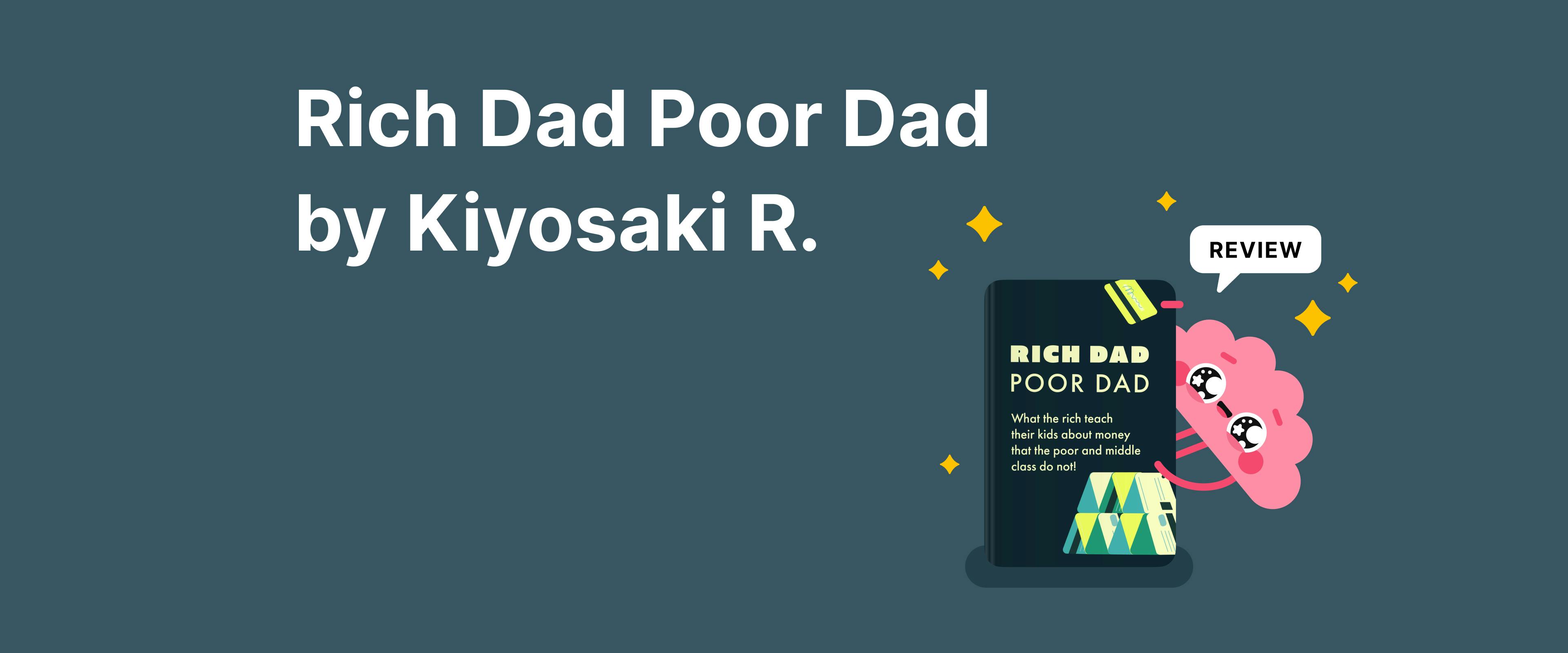
As I eagerly open the pages of Robert Kiyosaki's bestseller, "Rich Dad Poor Dad," I'm hit with an instant wave of anticipation. Much like my experience with James Clear's "Atomic Habits," it's clear that this isn't just another personal finance book; it's a journey into shifting paradigms and embracing new ways of thinking. Today, I'll take you through an in-depth review of this influential book, exploring its core lessons and impact.
The power of perspective: The core premise
"Rich Dad Poor Dad" is centered around the idea of contrasting views of money and wealth. Kiyosaki presents his own father, a highly educated but financially insecure man, as the 'Poor Dad,' and his friend's father, a business owner with a keen eye for investments, as the 'Rich Dad.' The portrayal of these two individuals reveals two starkly contrasting attitudes towards wealth, serving as the driving force behind the lessons encapsulated in this book.
Kiyosaki's ability to juxtapose the perspectives of these two pivotal figures in his life paints a vivid picture of how our upbringing and education shape our views on money and influence our financial futures. The main take-home message is not about how much money one earns, but how one manages, invests, and grows it.
Shaking up financial education: A journey into wealth building
A critical focal point of "Rich Dad Poor Dad" is the examination of our traditional education system. Kiyosaki fervently argues that formal education often falls short in preparing us for financial success. Schools teach us to strive for job security and a steady paycheck rather than fostering a mindset of wealth creation and financial independence.
The 'Rich Dad' instills in young Kiyosaki the value of financial intelligence and the merits of entrepreneurship. He learns that financial security isn't about earning a high salary, but building and leveraging assets. Conversely, the 'Poor Dad' represents the traditional, and arguably outdated, pathway to success: excel in school, get a good job, save for retirement, and hope for the best.
This paradigm shift, from seeking employment to creating business opportunities, is a thread that runs throughout the book. Kiyosaki emphasizes the importance of financial education and the cultivation of business acumen as crucial elements to achieving financial freedom.

How to Take Control of Your Money and Shape Your Financial Freedom
Become a pro at budgeting to never be anxious about what’s in...
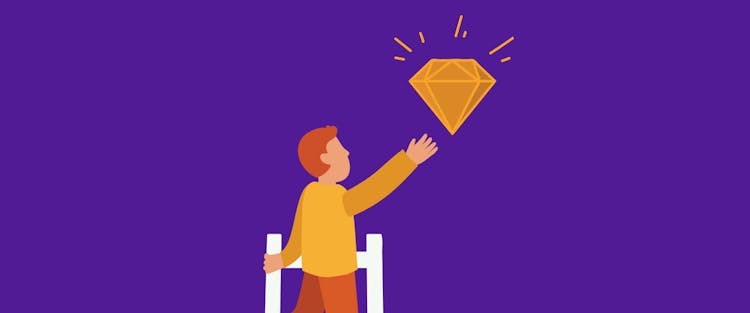
How to Side-Hustle Your Way to Wealth
Discover reasons for getting a side hustle and steps for star...

10 Best Apps For Making Money Fast
Searching for the best money-making apps for Android or iPhon...
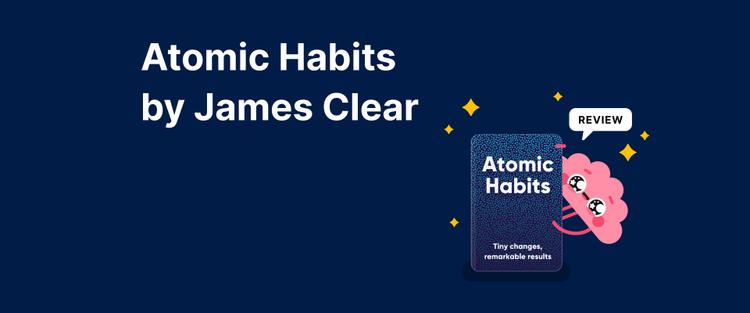
Unpacking "Atomic Habits" by James Clear: It's Not Your Usual Self-Help Guide
Unlock your atomic power with 'Atomic Habits' by James Clear....
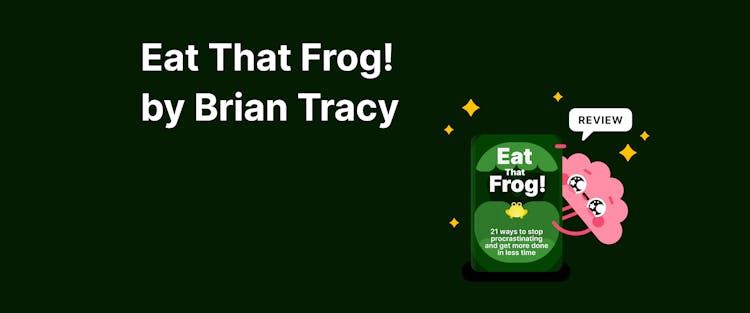
Review of "Eat That Frog" by Brian Tracy: Boost Your Productivity
Discover practical techniques and effective strategies to ove...
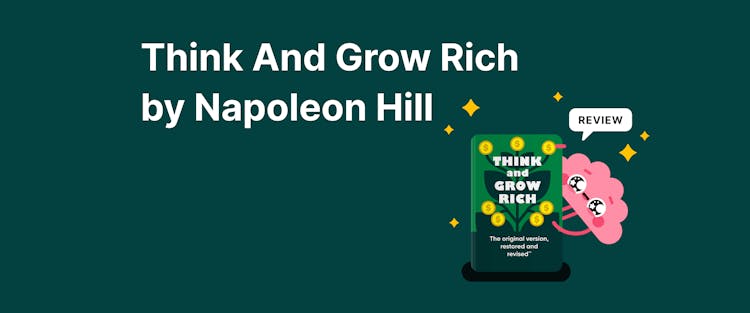
Book Review: Napoleon Hill's Masterpiece, Think and Grow Rich
Join Headway in unpacking the principles of success in our re...
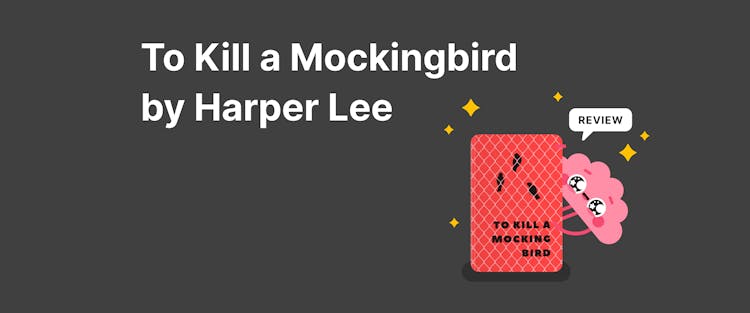
Harper Lee's 'To Kill a Mockingbird' Book Review by Headway
Uncover the hidden depths of Harper Lee's 'To Kill a Mockingb...
- Share full article
Advertisement
Supported by
Off the Shelf
Reconsidering the Advice in 3 Popular Personal Finance Books

By Paul B. Brown
- Oct. 11, 2019
In times of economic stress, it is good to know the basics of personal finance.
Many people turn to books for help, so we decided to go back and review three of the most popular finance books of the last 15 years: Suze Orman’s “The Nine Steps to Financial Freedom” (Currency, $16.99); Dave Ramsey’s “The Total Money Makeover” (Nelson Books, $26.99); and Robert T. Kiyosaki’s “Rich Dad, Poor Dad” (Plata Publishing, $8.99).
They all have something worthwhile to offer, but after rereading them, I found that all had a glaring omission: a lack of substantive advice on investing. You will have to go elsewhere for an in-depth discussion of how to set up a portfolio and choose among stocks, bonds, exchange-traded funds or mutual funds.
What all three books do emphasize is the need to buttress your finances by doing such things as reducing debt and expenses. And they share a constant refrain: You are ultimately responsible for your own financial success.
The authors have different takes on how to succeed, though. Ms. Orman says trust your instincts. Mr. Ramsey says relentlessly eliminate every last shred of debt. And Mr. Kiyosaki says emulate the rich, who have figured out how to “have money work for them.”
Oddly, for books centered on bolstering wealth, all three advocate contributing to charity. They say this is the right thing to do in itself, but they also say it’s worth doing on a spiritual level: The more you share with the universe, they contend, the more the universe will share with you.
Why have the books been so popular? The spiritual content may account for some of it. But the powerful media presence of all three authors has certainly helped.
Ms. Orman had a show on CNBC for more than a decade and now makes corporate speeches on personal finance. Mr. Ramsey has a syndicated radio show, and Mr. Kiyosaki appears frequently on television and conducts seminars.
As for quality, Ms. Orman’s book is the best of the three for standard financial issues, though each has an undeniable appeal.
‘The Nine Steps to Financial Freedom’
The good things about Ms. Orman’s book start with her ability to reduce financial planning to its basics, and with her sensible suggestions on how to reach your personal goals.
“Unrealistic budget cuts, like unrealistic diets, never work,” she writes. Pare back modestly here and there, she says, rather than try to make big trims. And Ms. Orman emphasizes often-overlooked aspects of adult life like writing a proper will and appointing someone who will be able make health care decisions for you, in case, at some point, you can’t.
While she doesn’t offer detailed financial advice here, Ms. Orman, a former stockbroker, does recommend that you own index funds and diversify your holdings.
Unfortunately, the book is a bit out of date. It was first published in 1997, hasn’t been revised since 2012 and contains references to events like the Dow closing at 11,000. That last happened in 2010.
Her tone is supportive and intimate, and it frequently veers into the ethereal.
Most unconventional idea: “Money is a living entity and it responds to energy exactly the same way you do. It is drawn to those who welcome it, those who respect it.”
Questionable advice: “Even if you own just one mutual fund, your money is still quite diversified, because you own a little of everything they’re invested in.”
That depends on the fund you own. If your only holding is an actively managed small-cap mutual fund, all you own are parts of small-cap companies preferred by that fund manager. You are far from diversified.
Representative sentence: “When it comes to money, freedom starts to happen when what you do, think and say are one.”
‘The Total Money Makeover’
Mr. Ramsey has one major theme, which he hammers home until you want to scream. “To the exclusion of virtually everything,” he says, eliminate debt.
The only possible exception he allows is a small mortgage that you can easily afford (even then he urges that you pay that off quickly).
If you have any debt, even if your employer will match the first 3 percent you put into your 401(k) annually, Mr. Ramsey says, you should not take advantage of the match. He says it is better to put that money toward what you owe.
Financially, that makes no sense, unless you are paying interest charges of greater than 100 percent on what you borrowed. If your employer is matching your retirement contribution, you are getting a 100 percent return on what you put in. Yet Mr. Ramsey says that while he understands the math, being debt-free is more important.
I don’t agree. Advising people to forgo their company’s retirement match is one of the many things I didn’t like about the book, which was originally published in 2003 and has been updated several times since. The last revision was in 2013.
Mr. Ramsey seemed to have trouble finding enough to say. On the bottom of every page you will find this line: “If you live like no one else, later you can live like no one else.”
That epigram would be just fine, if stated once. But the constant repetition seems contrived to fill space, as does the unusually large type. (Yes, it was nice that I did not have to use my reading glasses, but still.) Even with those features, the book is barely over 200 pages, not counting 20 pages of worksheets and an index.
His tone is consistently stern and no-nonsense.
Most unconventional idea: Pay off your smallest debt first, even if the other money you owe has a higher interest rate. The “quick wins” will help you build momentum.
Questionable advice: You can withdraw 8 percent of your retirement savings annually and not outlive your money .
Most experts say a safe annual withdrawal rate is much lower, no more than about 4 percent or, using careful rules , perhaps 5 percent.
Representative sentence: “I was given a calling: to show people the truth about debt and money and to give them the hope and tools necessary to set themselves free financially.”
“Rich Dad, Poor Dad”
Mr. Kiyosaki reminds me of Ayn Rand. He says you should focus relentlessly on achieving total independence from the crowd — financial independence, in Mr. Kiyosaki’s case.
He presents his financial tenets in a narrative structure that resembles a novel, contrasting what he learned from his biological father (“get a secure job, work hard, play it safe”) and his other “dad,” a rich entrepreneur who forged an independent financial path while living below his means.
The book was first published in 1997 and updated, most recently, in 2017. As it unwinds, you see Mr. Kiyosaki, who served in the military, shift from a job as a Xerox salesman to his vocation as an investor, ending up squarely on his “rich dad’s” path. He soon buys real estate to minimize his dependence on a paycheck and begins to shelter income and minimize taxes by setting up corporations.
Own things that generate wealth, he says. In addition to income-producing real estate, he says, that includes stocks, bonds and royalty-generating intellectual property (inventions, books and the like).
Despite the brisk narrative, the book has a ponderous tone: It reads like a lecture from an economics professor.
Most unconventional idea: Don’t focus on your job or career. Think primarily about building personal wealth.
Questionable advice : “With low interest rates, and an uncertain stock market, the old adages of saving and investing for the long term make no sense.”
Saving and investing for the long term are exactly what most experts say you should do.
Representative sentence : “The main cause of poverty or financial struggle is fear and ignorance, not the economy, the government or the rich.”
How Useful Are These Books?
While the lack of detail on investing is disappointing and the perspective is often quirky and sometimes questionable, all three books offer sprinklings of solid counsel: Eliminate debt. Live below your means. Look for ways to supplement your income.
That’s always good advice.
As is this, which came from my immigrant grandfather: Dig your well before you’re thirsty.
What he meant was prepare for the inevitable while you have time.
These books are flawed, but if they teach people that much, they have real value.
A Guide to Making Better Financial Moves
Making sense of your finances can be complicated. the tips below can help..
Can your investment portfolio reflect your values? If you want it to, it is becoming easier with each passing year .
The way advisers handle your retirement money is about to change: More investment professionals will be required to act in their customers’ best interest when providing advice about their retirement money.
The I.R.S. estimates that 940,000 people who didn’t file their tax returns in 2020 are due back money. The deadline for filing to get it is May 17.
Credit card debt is rising, and shopping for a card with a lower interest rate can help you save money. Here are some things to know .
Whether you’re looking to make your home more energy-efficient, install solar panels or buy an electric car, this guide can help you save money and fight climate change .
Starting this year, some of the money in 529 college savings accounts can be used for retirement if it’s not needed for education. Here is how it works .
The Spreadsheet Dad
A family and personal finance blog.

Book Review: Rich Dad Poor Dad – Robert Kiyosaki
September 1, 2018 thespreadsheetdad.
Rich Dad Poor Dad was the first personal finance book I read, it also happens to be one of the most popular personal finance books ever written, having sold 32 million copies (at the time of publishing this article).
In the book author Robert Kiyosaki recounts the entertaining stories from his childhood, right through to adulthood and along the way points to the lessons from his two ‘Dads’. The two ‘Dads’ being his Rich Dad, who is actually his friends father and his Poor Dad, who is his real father.
The stories are quite entertaining and fun to read, particularly the stories from his childhood learning from his Rich Dad. From setting up a highly successful comic book library from his parents basement to getting put to work for free in one of his Rich Dads stores.
Whilst Robert provides 6 lessons (listed below) the book is not exactly an instructional style finance book, rather it is more about driving home the importance of mindset in wealth creation.
The rich don’t work for money
The importance of financial literacy
Minding your own business
Taxes and corporations
The rich invent money
The need to work to learn and not to work for money
In the book his friend’s father, the “Rich Dad”, takes him under his wing at a young age and helps him understand business and how to become wealthy. During this education from his “Rich Dad” he becomes well aware of why his real dad is poor despite being well educated and having a good and stable job.
People tend to have polarising views on the book, some love it and some think it is rubbish. Personally I think, while it is certainly not perfect and there are parts that are quite vague around the “examples” there is certainly a lot of value to be had from Rich Dad Poor Dad, especially around having the correct mindset to become wealthy, how to recover from failure and how to maintain wealth.

Our education system is flawed
Robert very rightly points out that our current education model is designed to produce employees and does not encourage entrepreneurship, highlighting the need for financial literacy to become part of the curriculum.
This is a subject that is very close to my heart, having two kids of my own so I could not agree with this and am personally doing everything I can to ensure my kids grow with a good level of financial literacy.
If nothing else from this book I took away this little tidbit that I use with myself and my kids when considering an expenditure that is not currently within reach, and I wish it is something that I knew sometime ago.
My poor dad said, “I can ‘t afford it . My rich dad asked, “How can I afford it ?”
This line alone helps shift the mindset from poor to rich.
(I have just purchased Scott Pape’s latest book The Barefoot Investor for Families: The only kids’ money guide you’ll ever need so I have to have a review up shortly.)
What is an Asset?
This is perhaps one of the more polarising views that Robert discusses in his book.
An asset is something that puts money in my pocket. A liability is something that takes money out of my pocket.
In general people consider their home an asset as it grows in value, however Robert’s view is that is actually a liability as it take money from your pocket, even if you have paid it off in full it still takes money from you via maintenance cost and utility costs and it does not produce you any income.
Whilst this does not exactly align with general accounting standard, in order to become financially free you must have income generating assets. There is no use being equity rich and cash poor.
I tend to agree with Robert, this is the view that people should be taking when considering their investments. What good is an investment property that is losing you money? How can it be an asset if it is not putting money in your pocket each month?
There are points in the book where the Robert does seem to downplay the risk in some of his investment suggestions, which has lead to some criticism. The types of deals that he talks about are also not easily accessible to most people and in some cases may not even be relevant in the current economic climate.
In his defence he does also say that you should not invest in something that you do not fully understand.
In summary, I think this book is an excellent starting point for someone beginning the journey to financial freedom as it does help you to shift your mindset when thinking about money. I have also read Rich Dad’s Cashflow Quadrant which builds on many of the things in this book and I also would recommend.
Thanks for reading.
If you have an read Rich Dad Poor Dad I would love to hear your opinion in the comments below.
Share this:.
- Click to share on Twitter (Opens in new window)
- Click to share on Facebook (Opens in new window)
- Click to share on LinkedIn (Opens in new window)
- Click to share on Pinterest (Opens in new window)
- Click to email a link to a friend (Opens in new window)
- Click to print (Opens in new window)
- Skip to primary navigation
- Skip to main content
- Skip to primary sidebar
- --> Search in https://comlib.org/
- Search the CATALOG for books and more
- Search the CALENDAR for programs and events
- Search the WEBSITE for general information
- Use My Library Account
- Get a Library Card
- Reserve a Room
- Find Books and More
- Renew or Place a Hold
- Request an Item
- Digital Collections
- Computers and Printing
- Ask a Librarian
- Books, eBooks, and More
- Children’s and Young Adult Library
- Research and Learn
- Center for Regional History
- Library Policies
- Frequently Asked Questions
- Calendar of Events
- Event Archive
- 2024 Adult Summer Reads
- Community Library Book Club
- 2024 Community Speaker Series
- Hemingway Distinguished Lecture
- Sun Valley Early Literacy Summit
- To Taste Life Twice 2024 Seminar
- Wood River Museum Current Exhibits
- Exhibition History
- Museum History
- Hemingway House and Preserve
- Writer-in-Residence Program
- Ernest Hemingway Seminar
- Staff and Board of Trustees
- Library Blog
- Newsletters and Reports
- Employment & Volunteer Opportunities
- The Community Library
- Gold Mine Stores
- Wood River Museum
- Regional History Reading Room
- Historic Photographs
Book Review: Rich Dad Poor Dad
Gold mine product quality manager daniel velasco recommends rich dad poor dad by robert kiyosaki..
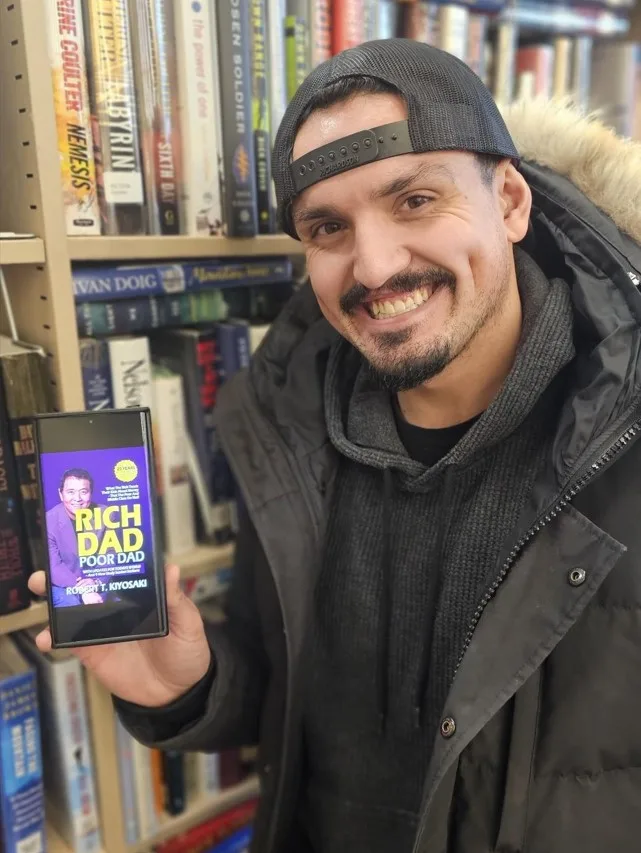
Rich Dad Poor Dad by Robert Kiyosaki challenges conventional beliefs about money and wealth. The author shares insights from two fathers, his own “poor dad” a well-educated but financially struggling government worker and his friend’s “rich dad,” a successful businessman and real estate investor.
Throughout the stories of his two father figures, Kiyosaki highlights the importance of financial literacy and smart investing.
What I appreciate most about this book is its importance in developing a financial mindset that goes beyond just saving and budgeting. Kiyosaki encourages readers to think creatively about generating income and building assets and inspires us to take control of our financial futures. While some may find the book’s ideas uncommon, I believe they are precisely what young adults need to hear in order to break free from limiting beliefs about money and build a brighter financial future.
Find Rich Dad Poor Dad in print, ebook, and on CD here.

Support the Library
- Skip to primary navigation
- Skip to main content
- Skip to primary sidebar
- Skip to footer

Holistic investment planners, financial planning Chennai, Private wealth management Chennai
Financial Planning chennai India, Private wealth management chennai India, Investment Advisory India, Systematic Investment Plan, Mutual Fund SIP, Mutual Fund ELSS, Tax Saving scheme

Rich Dad Poor Dad: Book Review, Summary & Key Takeaways
by Holistic Leave a Comment | Filed Under: Wealth Management
Today we are looking at “Rich Dad, Poor Dad” by Robert Kiyosaki. One of the very famous books on personal finance.
I will quickly take you through the gist of what the book is all about.
This book was first published in 1997, and the overarching theme of this book is How to Make Money as a Tool for Wealth Development.
This is a very interesting book because it destroys the age-old beliefs that you and I inherited from our forefathers. It also denies the fact that the majority of rich people are born with a silver spoon!
Table Of Contents
1.)Quick Summary 2.)Rich Dad Poor Dad – Wealth Creation 3.)Six Lessons From Rich Dad Poor Dad 4.)Stay Rich! 5.)Rich Dad Poor Dad – Steps For Financial Genius 6.)Assets vs Liabilities – Insights From Rich Dad Poor Dad 7.)Concept Of Tax 8.)Rich Invent Money 9.)About The Author 10.)Conclusion
1. Quick Summary
Rich Dad and Poor Dad revolves around three main characters: Poor Dad, Rich Dad, and Son (the author himself as the narrator of the book).
The Rich Dad is the father of his best friend who happens to be an eighth-grade dropout, not qualified and did not study well, but this dad believed in financial education, not just academic education. The Poor Dad is actually Kiyosaki’s biological father.
His biological father is highly qualified and very well educated, and he believes in the principle that you must study hard so that you get good grades, this is what typically happened with all of us when we were children, especially in India. Right?
2. Rich Dad Poor Dad – Wealth Creation
The book explains the principles of cash flow, balance sheet, income statement, assets, and liabilities in an easy-to-understand manner. The author hopes that everyone was taught the fundamentals of finance from childhood, as he was, which is one of the reasons he wrote this book.
This is a given that parents always persuade you to study hard, and get good grades, so that you get a good job, a well-paying job. Despite all of this, his poor dad did not do financially well, which basically talks of the fact that your qualifications, your profession, and your job may not guarantee wealth creation.
Please remember I’m using the word ‘ wealth creation’ . Your good grades, your good job, your profession, and your job title could perhaps guarantee good income. You may be earning well, but you may not necessarily create wealth

3. Six Lessons From Rich Dad Poor Dad
If you look at the book, he talks about six lessons that he has learned from his Rich Dad about making money, and he also talks about the mistakes made by his Poor Dad.
That’s also important, right? For example, if you want good health, you should know what are the foods that you’re supposed to eat. Equally important is that you also should know what to avoid. Similarly, what are the lessons that he has learned from his Rich Dad, and what are the mistakes made by his Poor Dad so that you and I don’t make the same mistakes?
Lesson 1: The wealthy do not work for a living. Lesson 2: Financial Literacy Lesson 3: Take Care of Your Own Business. Lesson 4: The History of Taxes and Corporate Power. Lesson 5: The Wealthy Create Money. Lesson 6: Work to Learn, Not to Make Money.
4. Stay Rich!
“It’s not just about becoming rich, it is also important to stay rich”.
What are the obstacles that have to be overcome to become rich and stay rich?
- Apprehension
- Poor Habits
Shortcomings motivate the Fearless Man since they provide a learning experience from which they might improve. The Lazy and arrogant do not achieve financially because the agony and misery of losing money outweigh the delight of being wealthy.
They chose a life that is basic, safe, and little. They may buy large houses and expensive cars, but they do not prioritize large investments. The bulk of people suffer financially because they play to avoid losing rather than to win.
5. Rich Dad Poor Dad – Steps For Financial Genius
“The poor and the middle-class work for money, and the rich have money work for them”.
There are 10 steps that Robert Kiyosaki talks about in his book to develop your financial genius. This is in a nutshell what the book is all about, and these are some of the lessons from his book.
- 1.Have a strong emotional reason or purpose for doing what you do, a mix of wants and dislikes.
- 2. Understand the power of choice and pick what to do on a daily basis, including developing good habits and educating yourself.
- 3. Choose your friends carefully by utilizing the power of association, and avoid listening to impoverished or scared people.
- 4. Master the ability to learn quickly and devise a money-making technique.
- 5. Pay yourself first by developing the ability to handle your cash flow , people, and personal time with self-discipline.
- 6. Choose exceptional team members and generously compensate them for their advice, because the more money they make, the more money you will make.
- 7.”How quickly can I get my money back?” Emphasize more on getting the money back.
- 8. By focusing on self-discipline to direct money to create more, you can use the money earned by assets you own to buy indulgences.
- 9. Have a role model to look up to and use their genius to your advantage.
- 10. Recognize that if you want something, you must first give something.
6. Assets vs Liabilities – Insights From Rich Dad Poor Dad
The necessity of understanding the distinction between assets and liabilities and focusing on investing in assets is highlighted throughout the book and referred to as the “one and only rule.”
Most of us, when we learned assets and liabilities, we were taught that assets are those which increase in value, and liabilities are those which reduce in value.
Robert Kiyosaki talks about an additional point.
“ That assets produce income and they also appreciate”.
They produce income, appreciate, liabilities, and take money out of your pocket. That is why he also talks about our own personal real estate. The house that we stay in may not be an asset because you are living in that house and it’s not producing any income for you.
- Look After Yourself!
He also talks about minding your business, which is basically looking at yourself, trying to pay off your debts as much as possible, being in zero debt, and starting investing in assets that can produce income.
The book discusses looking at yourself first and trying to pay off your debts before investing in assets.
7) Concept Of Tax
The book talks about the concept of tax in a very beautiful way. The equation is very important to understand. He says that between salaried versus business owners, which is self-employed.
Companies, business owners, self-employed. The formula is, Earn → Spend → Pay Tax. Spending can be taken as an expenditure in the business. You are left with a very limited, little amount of taxes to be paid. You and I are salaried employees.
We work for companies. We also earn, but we pay tax because there’s also TDS that already takes away money. Then what remains we spend.
So, self-employed, people have flexibility. They can structure their expenses. The equation is beautiful. Earn → spend → Pay Tax.
If something remains, you pay tax, otherwise, you don’t even pay tax. You and I have no choice because there’s a TDS.
8) Rich Invent Money
In this book, Robert Kiyosaki talks about the rich inventing money. They identify opportunities that other people have not found and they work with intelligent people..“I recommend to young people to seek work for what they will learn, more than what they will earn. Look down the road at what skills they want to acquire before choosing a specific profession and before getting trapped in the Rat Race”.
Again, this is very interesting , “It’s not learning to work, it is working to learn”.
which means you don’t work for money. Identify skills that you want to acquire before you choose a profession.
Isn’t it true that the majority of us have ended up in our profession by chance? Robert Kiyosaki says to pick a profession, and then figure out what abilities you want to develop so that you may be the highest earner in that profession.
9) About The Author
Robert Kiyosaki grew up in the small Hawaiian town of Hilo. In New York, he attended Kings Point Merchant Marine Academy. Following graduation, Robert turned down a well-paying position with Standard Oil to join the Marine Corps as a helicopter pilot during the Vietnam War.
Following his military duty, Robert went to work for the Xerox Corporation. His wealthy father advised him that the key to every successful firm is sales.
Robert rose to become Xerox’s top seller. His entrepreneurial instinct took over from there. He and his brother founded the company Rippers. Rippers was the first firm to commercialize the nylon and Velcro “surfer” wallet.
Robert and his wife, Kim, invented and launched the CASHFLOW board game in 1996 to teach people about money and investing creatively and excitingly.
In 1997, Robert published Rich Dad and Poor Dad, and they established The Rich Dad Company. The book and the board game are now more popular and relevant than ever.
Robert has written 27 books. He has appeared as a featured guest on media channels all around the world. He is the podcast host of the Rich Dad Radio Show, a world-renowned speaker, and a life-long learner.
10) Conclusion
This book questions your thought process. Robert Kiyosaki has talked about overcoming obstacles, and how to get started, and there’s a to-do list also that he provides.
Rich Dad Poor Dad is available in multiple languages for readers. The first step before handling your finances is to improve your financial literacy. One of the best ways to improve financial literacy is by reading books.
Reader Interactions
Leave a reply cancel reply.
Your email address will not be published. Required fields are marked *
Save my name, email, and website in this browser for the next time I comment.
- Ideal Client
- Jobs(Full Time)
- Testimonials
Connect With Us
Holisticinvestment.in Old No:60/3 , New No : 26 Burkit Road, T.Nagar Chennai – 600017 INDIA.
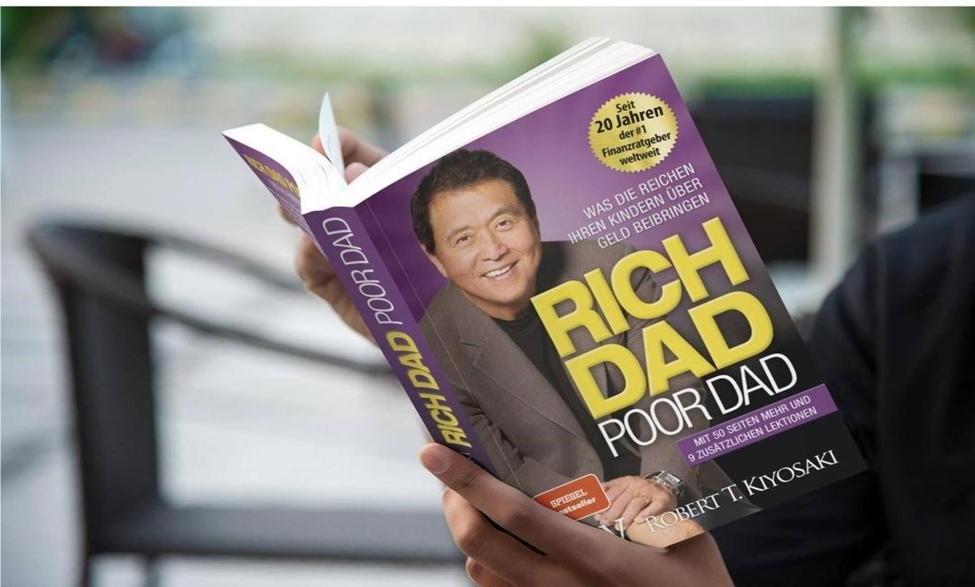
Book Review: “Rich Dad Poor Dad” by Robert T. Kiyosaki
Listen to this article
“Rich Dad Poor Dad” is a groundbreaking personal finance classic penned by Robert T. Kiyosaki that challenges conventional beliefs about money and wealth. With its straightforward narrative and practical insights, the book has captivated millions worldwide, making it a must-read for anyone seeking financial independence.
In this engaging memoir, Kiyosaki contrasts the financial teachings of two father figures in his life: his biological father (referred to as “Poor Dad”), who followed traditional paths of education and stable jobs, and the father of his best friend (nicknamed “Rich Dad”), a successful entrepreneur who viewed money and investing from a unique perspective.
One of the book’s central tenets is the importance of financial education, which Kiyosaki believes is inadequately taught in schools and homes. He highlights how traditional schooling often perpetuates the “get a good job, work hard, save money, and retire” mindset, which can trap individuals in the cycle of living paycheck to paycheck. In contrast, “Rich Dad” imparts valuable lessons about the significance of financial literacy, creating assets, and leveraging money to work for you.
Throughout the book, Kiyosaki shares simple yet profound principles that can lead to financial success. He emphasizes the significance of investing in oneself, acquiring assets that generate passive income, and avoiding excessive liabilities that drain one’s financial resources. These fundamental concepts, such as distinguishing between assets and liabilities, have inspired many readers to rethink their approach to money and adopt a more strategic mindset.
Furthermore, “Rich Dad Poor Dad” stresses the value of taking risks and stepping out of one’s comfort zone to seize investment opportunities. Kiyosaki’s own experiences as an entrepreneur demonstrate that calculated risks can yield substantial rewards, paving the way to financial freedom.
Critics argue that some of Kiyosaki’s advice might be oversimplified, and his examples may not apply universally. However, the book’s true strength lies in its ability to ignite curiosity and encourage readers to explore the world of finance and investing further.
Lessons Learned from “Rich Dad Poor Dad”
The Importance of Financial Education : The book emphasizes the need for a solid financial education, which extends beyond traditional schooling. Understanding money, investing, and financial principles is crucial for achieving financial independence.
Distinguishing Assets from Liabilities: “Rich Dad” teaches the importance of knowing the difference between assets and liabilities. Acquiring income-generating assets and minimizing liabilities are essential steps towards building wealth.
The Power of Passive Income: Creating streams of passive income is a key aspect of achieving financial freedom. By investing in assets that generate income without constant effort, individuals can secure their financial future.
Embrace Risk and Learn from Failure: “Rich Dad” encourages taking calculated risks and viewing failures as valuable learning experiences. Embracing risks and learning from mistakes can lead to significant opportunities and growth.
Challenge Conventional Beliefs: The book challenges traditional notions about money, work, and success. By questioning conventional wisdom and thinking outside the box, readers can discover alternative paths to financial prosperity.
Work to Learn, Not Just to Earn: Kiyosaki advocates for a mindset shift from working solely for a paycheck to using work as a means to gain valuable skills and knowledge. Continuous learning and self-improvement can lead to increased earning potential and financial success.
Avoid the Rat Race: The “Rat Race” refers to the cycle of working for money to pay expenses, leading to perpetual financial struggle. The book encourages breaking free from this cycle by focusing on building assets and passive income.
Make Money Work for You: Instead of working tirelessly for money, “Rich Dad” advises making money work for you through smart investments and passive income streams.
Seek Opportunities in Adversity: Kiyosaki shares how challenging economic times can present opportunities for those who are financially educated and prepared. Being proactive during economic downturns can lead to substantial gains.
Foster a Mindset of Abundance: “Rich Dad” emphasizes cultivating an abundance mindset rather than dwelling on scarcity. Adopting a positive outlook and believing in one’s ability to create wealth can lead to greater financial success.
Learn to Manage Taxes: Understanding and managing taxes effectively can significantly impact one’s financial well-being. “Rich Dad” highlights the importance of tax education and legal strategies to minimize tax burdens.
Focus on Long-Term Goals: Building wealth is a gradual process that requires discipline and long-term thinking. “Rich Dad” advises setting clear financial goals and consistently working towards them over time.
In conclusion, “Rich Dad Poor Dad” is a compelling book that encourages readers to reevaluate their attitudes towards money and presents alternative ways of thinking about wealth and financial independence. While some aspects might be subject to individual interpretation, the book’s core message about financial education, smart investing, and embracing opportunities is undeniably valuable. For those seeking to improve their financial well-being and break free from conventional money paradigms, this book serves as a thought-provoking and inspiring guide.
Recommended Event >

RiseUp Summit:11 Years of Fostering Collaboration and Innovation

Driving Business Growth: Differentiation by Improving Customer Experience

How Can You Break Through the Mental Block and Get Your Creativity Back?

From Competition to Collaboration: How Big Companies Are Gaining Share in a Crowded Market?

Swypex Unveils Revolutionary Financial Platform for Businesses, Fueled by a $4M Seed Investment from Accel
Featured stories >.

How to Discover The Ideal Marketing Career Path for You

7 Egyptian Brands That Truely Supported Palestine

25 Made in Egypt Brands To Replace The Ones You’re Boycotting
Sign in to your account
Username or Email Address
Remember Me

Rich Dad, Poor Dad Summary – Robert Kiyosaki Book
Rich Dad Poor Dad is Robert Kiyosaki’s best-selling book about the difference in mindset between the poor, middle class, and rich. In this Rich Dad Poor Dad book summary, we’ll break down some of the best lessons Kiyosaki shares to help you become more financially literate. So, let’s dive in.
Post Contents
20 Years… 20/20 Hindsight
Introduction, chapter one: lesson 1: the rich don’t work for money, chapter two: lesson 2: why teach financial literacy, chapter three: lesson 3: mind your own business, chapter four: lesson 4: the history of taxes and the power of corporations, chapter five: lesson 5: the rich invent money, chapter six: lesson 6: work to learn – don’t work for money, chapter seven: overcoming obstacles, chapter eight: getting started, chapter nine: still want more here are some to do’s, final thoughts.
Start selling online now with Shopify

Rich Dad’s Lesson 1: “The rich don’t work for money.”
In today’s world, there’s never been a more significant divide between the rich and all other income classes. Some economists in California even noticed that about 95% of income gains between 2009-2012 went to the wealthiest people in the world– the one percent. Thus, showing that the biggest increases in income go to entrepreneurs and investors– not employees.
→ Click Here to Launch Your Online Business with Shopify
Rich Dad Lesson: “Savers are losers.”
The emphasis on saving is only found in the poor and middle class. However, the reason why savers are losers is that since 2000 there have been three massive stock market crashes.
- Dotcom Crash: 2000.
- Real Estate Crash: 2007
- Banking Crash: 2008
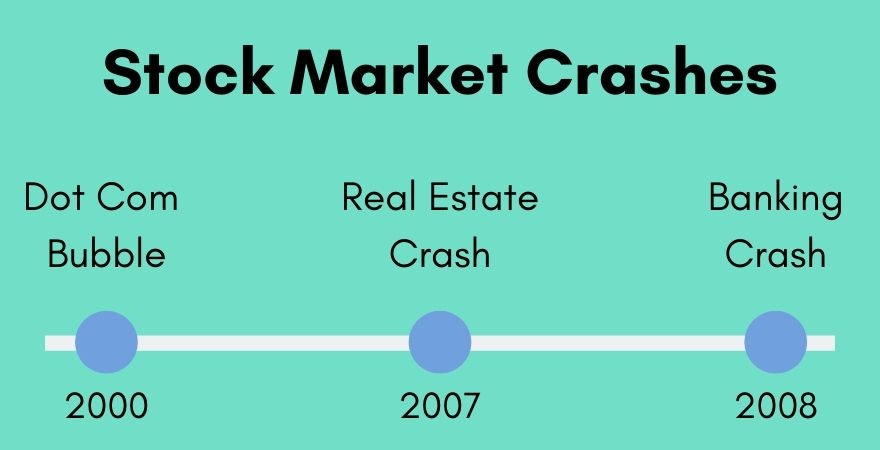
The first three crashes of the 21st century pale in comparison to the great crash of 1929. When you look at the data visually, you can see how big of an impact the crashes were.
Notably, after each stock market crash, the American government and the Federal Reserve Bank started “printing money.”
Today’s interest rates are relatively close to zero, which is what makes savers losers. And the biggest savers are the poor and middle class.
Rich Dad Lesson: “Your house is not an asset.”
When Robert Kiyosaki first published Rich Dad, Poor Dad in 1997, every publisher who had rejected his book had criticized the lesson regarding a person’s house not being an asset. Historically, people believed that your home was the biggest investment you can make.
However, it wasn’t until 2007 when “subprime borrowers began to default on their subprime mortgages,” that people realized that a house wasn’t an asset.
The real estate crash was caused by the rich, not the poor. “The rich created financially-engineered products known as derivatives.” Even Warren Buffett hated these, calling them “weapons of mass financial destruction.” The derivatives were the cause of the housing market collapse. Yet, somehow, the poor were blamed even though there were approximately $700 trillion in financial derivatives. Believe it or not, but that number has since exploded to $1.2 quadrillion in financial derivatives.
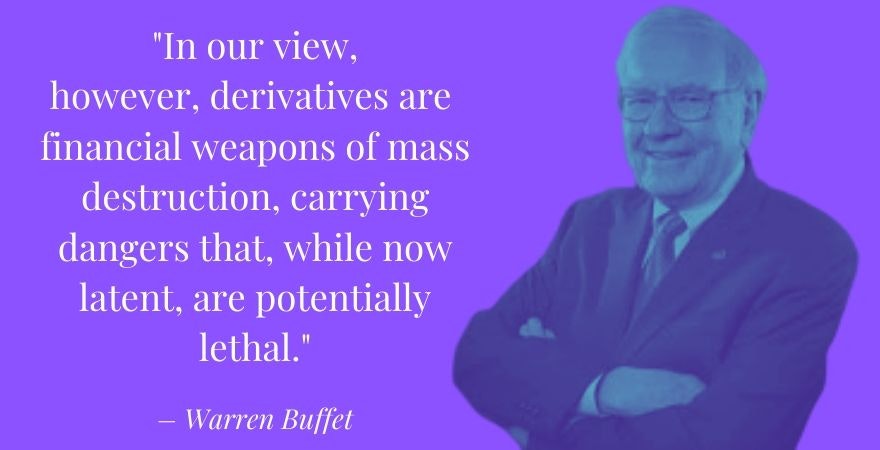
Rich Dad Lesson: “Why the rich pay less in taxes.”
Poor people often get angry when they learn rich people pay less in taxes. Instead, they should focus on learning from the rich as they pay fewer taxes legally.
The poor and middle class will always pay more taxes than the rich. This statement is true because it’ll always be the person who works for money who gets taxed the most.
When presidents promise to raise taxes on the rich, they typically mean the middle class. Not the real rich.
Robert Kiyosaki had two fathers: a rich one and a poor one. One was highly educated with a Ph.D. and so intelligent he completed his undergraduate degree in only two years. The other father didn’t even finish the eighth grade. While both men worked hard, were successful, and earned a lot of money, there was always one who struggled with money. And the other dad, well, he became one of the richest people in Hawaii.
By having two dads, with entirely different mindsets, Kiyosaki found himself comparing the two dads a lot. It was hard to figure out which dad he should listen to. Neither had found success yet. And both were experiencing financial struggles as they were still early in their careers.
Schools don’t provide financial education. Thus, causing the poor and middle class to be in debt. If millions of people need financial or medical assistance, Medicare and Social Security may run out.
Transitioning from the mindset of “I can’t afford it” to “How can I afford it?” forces you to think instead of letting yourself off the hook.
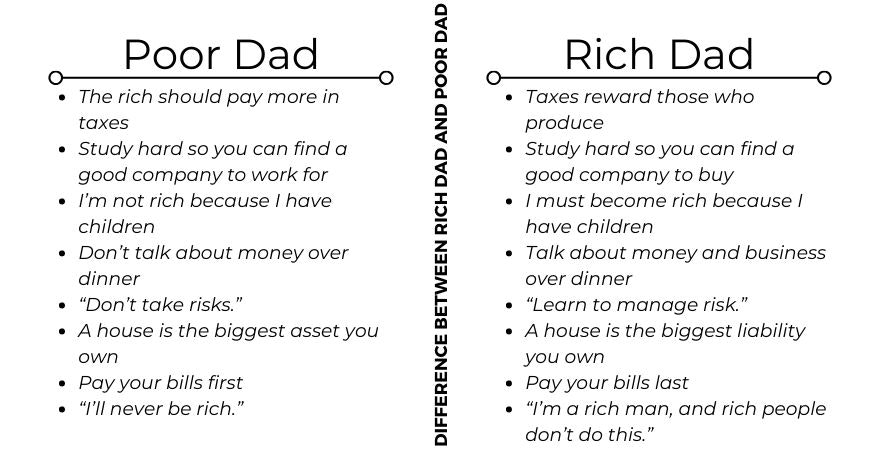
Poor Dad: The rich should pay more in taxes
Rich Dad: Taxes reward those who produce
Poor Dad: Study hard so you can find a good company to work for
Rich Dad: Study hard so you can find a good company to buy
Poor Dad: I’m not rich because I have children
Rich Dad: I must become rich because I have children
Poor Dad: Don’t talk about money over dinner
Rich Dad: Talk about money and business over dinner
Poor Dad: “Don’t take risks.”
Rich Dad: “Learn to manage risk.”
Poor Dad: A house is the biggest asset you own
Rich Dad: A house is a liability
Poor Dad: Pay your bills first
Rich Dad: Pay your bills last
Poor Dad: struggles to save a few dollars
Rich Dad: creates investments
Poor Dad: teaches how to write a strong resume
Rich Dad: teaches how to write a strong business and financial plan
Poor Dad: “I’ll never be rich.”
Rich Dad: “I’m a rich man, and rich people don’t do this.”
“The poor and middle-class work for money. The rich have money work for them.”
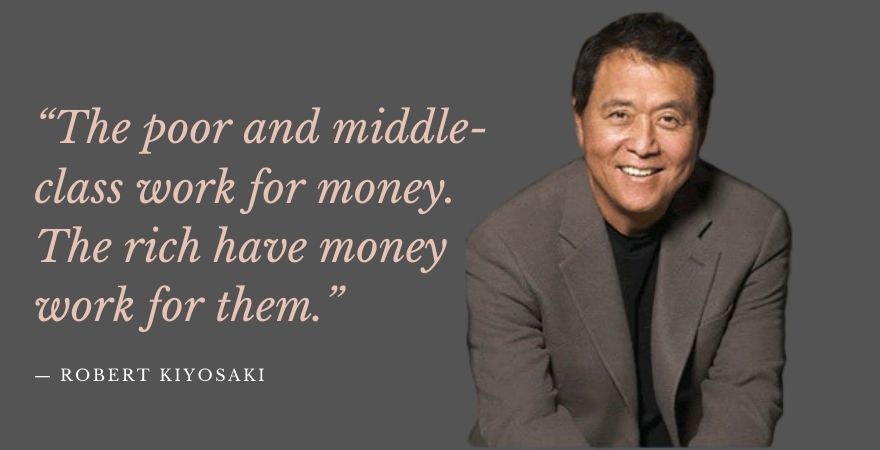
Growing up, Robert Kiyosaki went to the same school as the rich kids, simply because he lived on a different side of the street. Being poor, in a school filled with affluent students, made him seek an answer to the question, “how do I make money ?”
His best friend Mike was also poor, and so a friendship was struck between the two. The two spent an entire morning one Saturday brainstorming all the ways they could make money. Their first project wasn’t a success, nor was it legal. They decided to cast nickels out of lead to make money– literally. With a quick explanation of the laws of counterfeiting from Robert Kiyosaki’s poor dad, the pair went back to the drawing board.
Robert Kiyosaki’s poor dad suggested that the two learn how to make money from Mike’s dad (Robert Kiyosaki’s rich dad). Poor dad had heard from his banker how good the rich dad is at making money. Mike arranged a meeting time, and the two began their lessons.
Robert Kiyosaki arrived at 8 o’clock sharp for his meeting with Mike’s dad. When the meeting began, the rich dad told the two that he’d be happy to teach them but won’t be doing it in a classroom style. He proposed that the two boys work for him so that he can teach them faster. The two weren’t allowed to ask questions about the deal. And so the first lesson was learned: opportunities are fleeting, so you need to jump on them when they arrive. He offered to pay Robert and Mike 10 cents an hour, for three hours, every Saturday.
After a couple of weeks doing excruciatingly boring work, Robert told Mike that he wanted to quit . This response is what Mike’s dad was hoping for.
Before his meeting with his rich dad, Robert Kiyosaki’s poor dad told him to demand what he deserves at least 25 cents an hour and to quit his job immediately if he didn’t get a raise. Robert went to meet with his rich dad but was forced to wait 60 minutes longer than expected, which infuriated him. Robert felt that his rich dad hadn’t kept his end of the bargain of teaching him and that he was just trying to exploit him by making him work for him.
His rich dad noticed that Robert had sounded like his employees after only one month. Rich dad insisted that he was teaching Robert, but in a way that life teaches, not in the way that school does. The most effective way to learn is by doing, though most people consume education from books, which is the least effective way.
The main lesson he taught in the office that day was that Robert could either end up like his employees who blame others for his problems, or he could take another path and become a wealthy man.
Rich dad had suggested that the two boys find a new way to make money outside of working for someone else.
Lesson 1: “The poor and middle-class work for money. The rich have money work for them.”
Rich dad also shared how happy he was that Robert Kiyosaki got angry. He said, “anger is a big part of the formula, for passion is anger and love combined.” Fear is what controls employees that causes them to exploit themselves.
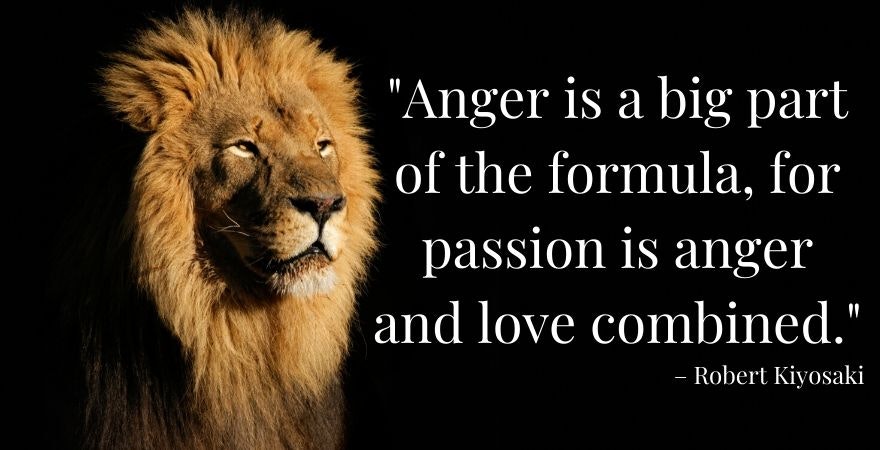
Rich dad continued, “…it’s fear that keeps most people working at a job: the fear of not paying their bills, the fear of being fired, the fear of not having enough money, and the fear of starting over.”
Employees often feel disappointed looking at their paychecks– especially after tax and deductions. This was nine-year-old Robert’s first introduction to taxes. It’s also how he learned that the rich don’t let the government do that to them, even though they earn more.
In a new deal, rich dad negotiated that Robert continues working for him, but for free. For the next three weeks, Robert and Mike worked for their rich dad for free. Then, on the third Saturday, he took them out to a park for some ice cream. He decided to introduce him to the trap of the rat race. He did this by offering to pay them twenty-five cents an hour. They said no. Rich dad then offered a dollar an hour. They said no. Then, two dollars an hour. They said no. Then, five dollars an hour. And they once again said no. The boys knew that they couldn’t be bought. They were committed to becoming wealthy.
Rich dad later pointed out that poor people often say they’re not interested in money. Robert Kiyosaki thought back to the times his dad would say, “I’m not interested in money. I work because I love my job.” This is how poor people often cover themselves up.
It’s essential to not give in to your emotions, such as fear, so that you can prevent any quick reactions and think objectively about a situation. The reality is a job is merely a short-term solution to a long-term problem. Rich dad’s focus is on teaching the boys how to have a choice of thoughts instead of a knee-jerk reaction to things.
One of the most empowering lessons rich dad taught in this section of Rich Dad Poor Dad was to “keep using your brain, work for free, soon your mind will show you ways of making money far beyond what I could ever pay you. You will see things that other people never see. Most people never see these opportunities because they’re looking for money and security, so that’s all they get.”
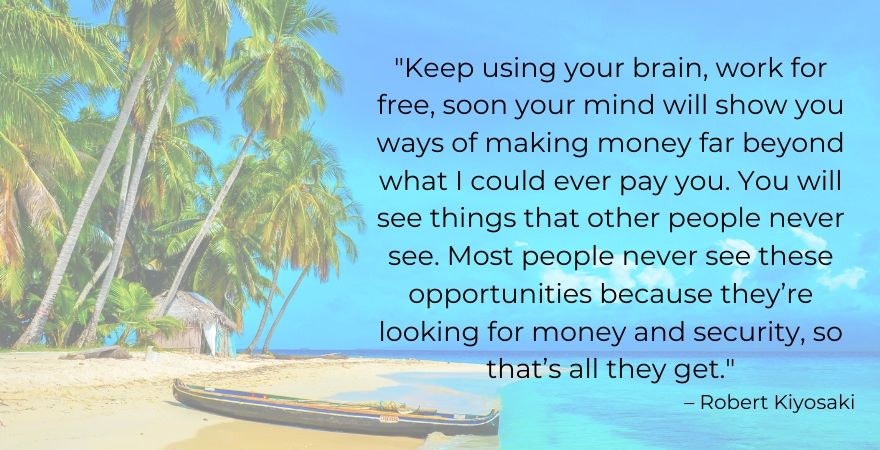
This lesson inspired the two boys to find a new way to make money. On one Saturday, they noticed Mrs. Martin cutting off the cover of the comic books and throwing them into a cardboard box. Since they weren’t allowed to resell the comic books, they decided to create a library for a fee where other kids could come over to read as many comic books as they like between 2:30 p.m. and 4:30 p.m. every day after school for only 10 cents. This deal was a bargain for the other kids who might’ve spent 10 cents buying a comic book. Each week, they averaged around $9.50, while paying Mike’s sister one dollar a week to manage the library. After three months, a fight broke out in the library, and Mike’s dad advised them to shut down the business. But they did manage to learn how to make money work for them instead of working for money.
“It’s not how much money you make. It’s how much money you keep.”
Robert Kiyosaki retired at the age of 47. He still works, but for him and his wife, Kim, working is an option as their wealth will continue to grow automatically.
In this section of Rich Dad, Poor Dad, Robert Kiyosaki shares a simple story. In 1923, the greatest leaders and richest businessmen joined together for a meeting in Chicago. Twenty-five years later, nine of them had their life end in the following ways:
- Four died broke
- One went insane
- Two were released from prison
- Two committed suicide
This unfortunate turn was likely due to their lives being drastically affected by the 1929 stock market crash and the Great Depression.
The biggest financial lesson to learn is that it’s all about how much money you keep, not how much you make. And without financial literacy, you’ll lose your money soon.
Growing up, poor dad recommended that Robert read books while rich dad recommended that Robert master financial literacy. Robert shares, “If you are going to build the Empire State Building, the first thing you need to do is dig a deep hole and pour a strong foundation. If you are going to build a home in the suburbs, all you need to do is pour a six-inch slab of concrete. Most people, in their drive to get rich, are trying to build an Empire State Building on a six-inch slab.”
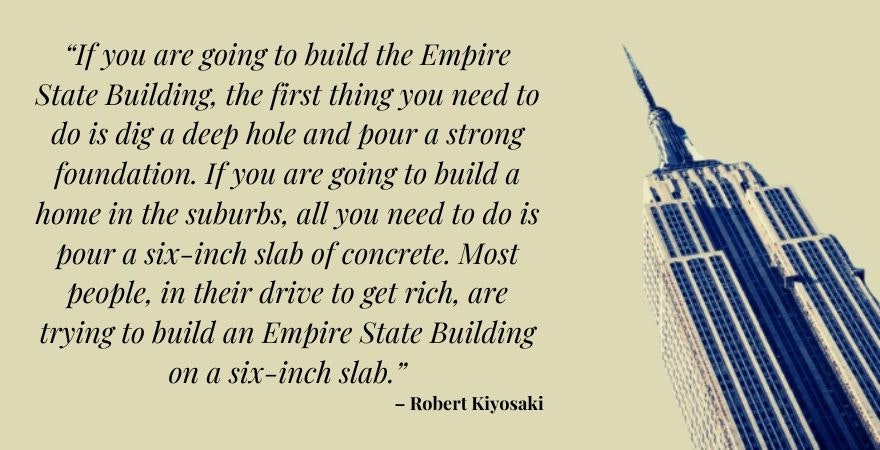
It’s vital to learn the subject of accounting if your long-term goal is to be rich – no matter how boring you think the topic is.
Rule #1: You must know the difference between an asset and a liability– and buy assets.
“Rich people acquire assets. The poor and middle class acquire liabilities they think are assets,” rich dad says.
The biggest challenge poor people have is knowing the difference between an asset and a liability. Knowing the difference between the two can help you become rich.
So, what’s the difference?
An asset puts money into your pocket. A liability takes money out of your pocket.
Assets add to your income. Liabilities add to your expenses. And the job of a poor person pays you an income that then covers your expenses. The job of a middle-class person pays you an income then pays down liabilities then pays expenses. However, for a rich person, their assets pay them an income. For example, their assets may give them rental income, dividends, interest, or royalties.
Here are a few examples of liabilities that the middle class own:
- Credit card debt
- School loans
Here are a few examples of assets that rich people own:
- Real estate
- Intellectual property
Many people who are poor or in the middle class often say, “I’m in debt, so I need to make more money.” However, getting money isn’t a problem. It’s the lack of financial literacy that’s the problem. So if they simply had more money, the problem might become worse. That’s why when people win the lottery or get a pay raise, they usually end up back in the same financial situation as they did before. If a person spends all they have, the pattern will continue every time they make money.
Professional success isn’t directly tied to academic success anymore. Most students leave their schools with limited financial literacy. Later in life, they find themselves struggling financially. What they need to know more than how to make money is how to manage their money. This skill is called financial aptitude. Most people learned how to work hard instead of how to make money work hard for them.
Taxes end up costing the poor and middle class in the long run. People often buy bigger homes to grow a family, and property tax rises. People’s salaries increase over time, and so social security tax also sees a rise. And before long, their liabilities column is filled up with a mortgage and credit-card debt. Thus, trapping them in the rat race.
The secret to knowing how to make money is simply about creating assets instead of liabilities.
Golden Rule: “He who has the gold makes the rules.”

“Most financial problems are caused by trying to keep up with the Joneses.” You might choose to buy a bigger house, work harder, or get a promotion or pay raise.
As teenagers, Mike and Robert would work with their rich dad. They studied how he held meetings with his bankers, attorneys, accountants, investors, so forth. Even though his rich dad had left school at 13, he was now directing some very educated people.
Rich dad regularly told the two teens, “An intelligent person hires people who are more intelligent than he is.”
As a teenager, Robert realized he had more financial literacy than his poor dad as he was able to keep books and spent a lot of time listening to bankers, tax accountants, real estate brokers, and others like them.
In this section of Rich Dad Poor Dad, Robert Kiyosaki shares that many people view their home as an asset. However, in many cases, the value of a home doesn’t always go up. Sometimes people buy million-dollar houses that would sell for far less. Retirees such as Kim’s parents had a strain on their budget when their property taxes increased to $1,000 a month.
When Robert plans on buying a bigger house, he “first buys assets that will generate the cash flow to pay for the house.” He shares that as you continue to grow your asset column, over time, you’ll also see the growth of your income. And that’s why the rich keep getting richer– however, the reason why the middle-class struggles are because taxes increase as their salaries increase.
Employees work for three key groups:
- Company: Making the owners and shareholders rich
- Government: Possibly 100% of the work you do from January until May goes towards taxes
- Bank: Your biggest expenses are your mortgage and credit card debt
“Wealth is a person’s ability to survive so many number of days forward– or, if I stopped working today, how long could I survive?”
For example, if a person has $1,000 a month in cash flow from their asset column and they have monthly expenses of $2,000 a month, they will only be wealthy once they have $2,000 a month of cash flow to their asset column.
The average American only has less than $400 in savings, with an astounding 34% with none at all.
So to sum up:
- “The rich buy assets.
- The poor only have expenses.
- The middle class buy liabilities they think are assets.”
“The rich focus on their asset columns while everyone else focuses on their income statements.”
While most people assume that Ray Kroc, the founder of McDonald’s, is in the hamburger business, Kroc once told an MBA class that he’s actually in the real estate business. That’s why he carefully chose every location for his franchises. Today, McDonald’s owns more real estate than any other organization in the world – even the Catholic church.
When someone asks the average person, “What is your business?” they typically respond with their profession. However, they are not owners of the company they work for. They still need their own business. Otherwise, they’ll spend their life working for everyone but themselves. That’s the importance of minding your own business.
Financial hardship comes from spending your life putting money into someone else’s pocket instead of your own. But by working for others, they’ll be dependent on pay raises, getting second jobs, or working overtime.
Without a financial foundation, you’ll be stuck to your job and its security for the rest of your life.
However, it’s important to note that entrepreneurship can be a tricky path. In one instance, Robert Kiyosaki tried to get a loan. The loan committee saw that he owned a lot of real estate properties. However, they struggled to understand why he didn’t have a salary or a 9 to 5 job. Even though, at the time, he did own many assets such as Armani suits, art, golf clubs, and of course, property.
It’s also good to note that as you sell your assets, the government taxes you on the gains. Robert recommends to “keep your expenses low, reduce liabilities, and diligently build a base of solid assets.” If you have children, advise them to build assets before they move out or fall into the trap of the rat race.
Here are a few more assets that Robert recommends that you or your children acquire:
- “Businesses that do not require my presence. I own them, but they are not managed or run by other people. If I have to work there, it’s not a business. It becomes my job.
- Income-generating real estate
- Notes (IOUs)
- Royalties from intellectual property such as music, scripts, and patents
- Anything else that has value, produces income, or appreciates, and has a ready market”
Rich dad used to say, “If you don’t love it, you won’t take care of it.”
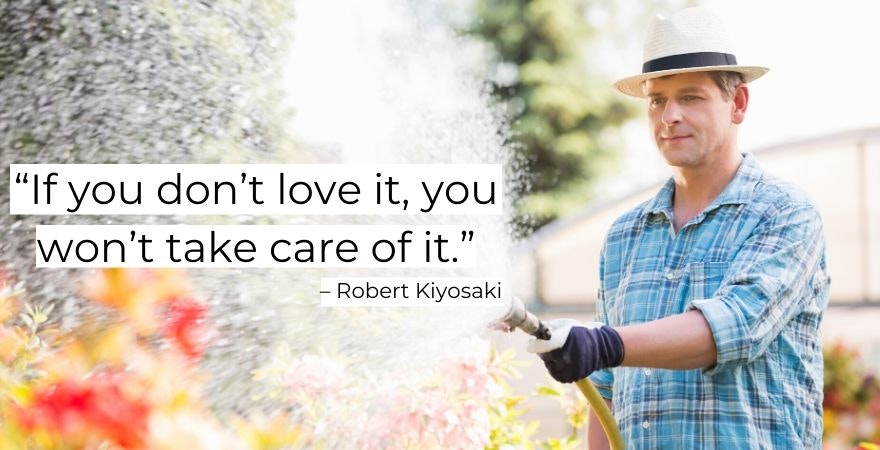
You can keep your day job, but you should also start buying assets like those listed above.
Since 90% of companies fail, Robert Kiyosaki’s goal is to sell the entire stock of a company within a year of going public.
To become rich, you’ll need to buy luxuries last. People who buy luxuries first are often in much debt. The aim is to build income-generating assets that can buy luxuries.
“My rich dad just played the game smart, and he did it through corporations– the biggest secret of the rich.”
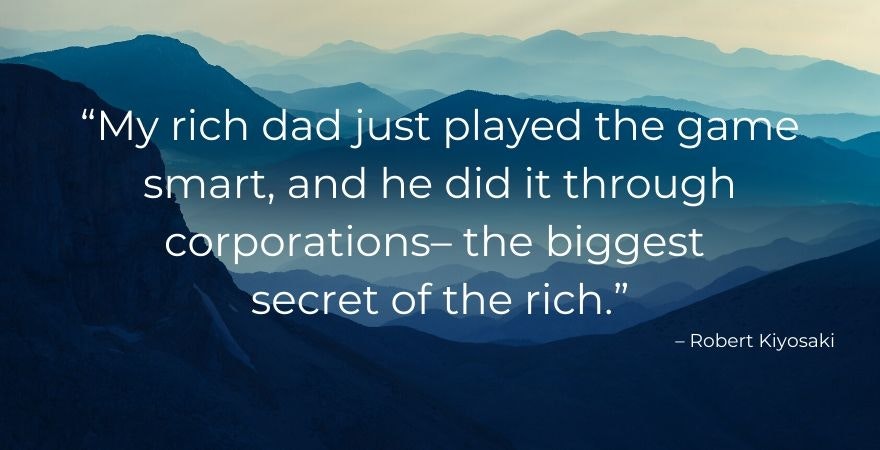
The poor often say, “‘Why don’t the rich pay for it?’ or ‘The rich should pay more in taxes and give it to the poor.’” However, the real rich never pay taxes. The people who pay taxes are the educated, middle class.
While poor dad knew the history of education, rich dad knew the history of taxes. Taxes originated in England and America temporarily to pay for wars. It wasn’t until 1874 when England permanently added income taxes as a requirement of its citizens. It started in 1913 for Americans. An interesting tidbit about taxes is that it was initially only for the rich to pay. That’s what governments told the poor and middle class to help get them on board with the idea. That was how it got voted into law in the first place.
Poor dad: paid to spend money and hire people; government gains respect the bigger it gets
Rich dad: gains respect of investor by spending and hiring less
Poor dad: the rich are ‘greedy crooks’
Rich dad: the government are ‘lazy thieves’
The rich don’t get taxed as tax laws help them to create jobs and provide housing. Thus, the government is dependent on the middle class for their tax revenue.
The rich put their money into a corporation. Their asset puts income into their corporation, and then corporate income can be used as income for their personal income statement. And the expenses from their personal income statement can go into the expenses for the corporation. Even though the masses continuously try to find ways to tax the rich, the rich consistently outsmart them.
Something to remember about the government is that if they don’t spend their allotted funds, they’ll risk losing money when the next budget is announced. They aren’t rewarded for being efficient spenders. Yet, entrepreneurs are rewarded for financial efficiency. The mindsets between the two are polar opposite.
The rich look for legal loopholes to avoid paying taxes. That’s why they often hire the smartest accountants and attorneys.
In real estate, Robert Kiyosaki uses one of these legal loopholes as well. There’s a section called 1031 in the Internal Revenue Code that allows a seller to delay the payment of taxes in w when they sell real estate provided that they buy a more expensive piece of real estate. Thus, by consistently trading up, he delays getting taxed until the time comes to liquidate. This strategy also allows him to continue building his asset column.
Knowing the law can help save you money (while also making sure you follow it).
Poor dad: climb the corporate ladder
Rich dad: own the corporate ladder
When Robert was in his mid-twenties working for Xerox, he realized how disappointing it was to look at his paycheck. His bosses would talk to him about promotions and pay raises. However, that only made him see his deductions rise too. He could see himself becoming his poor dad. This realization is what made him realize he needed to follow his rich dad’s path. So Robert turned to minding his business by building out his asset column so he could invest in Hawaii’s real estate market. This newfound motivation made him work harder at selling Xerox machines at work. He knew he was building something bigger than himself.
After three years of hard work, his real estate business was making more than he was at Xerox. His company bought him his first Porsche. His coworkers had no idea that he wasn’t spending his commissions on the Porsche but assets.
Financial IQ is made up of four key areas:
- Accounting: ability to read numbers
- Investing: the concept of money making money
- Understanding markets: knowing supply and demand
- Tax advantages: corporations can pay expenses before taxes, which employees can’t do. A corporation can spend everything it can and be taxed only on everything left over. You can expense car payments, insurance, repairs, health club memberships, and most restaurant meals.
- Protection from lawsuits: The rich use corporations to protect their assets from creditors, whereas the poor and middle class try to own everything themselves.
Business Owners with Corporations
Employees Who Work for Corporations
“Often in the real world, it’s not the smart who get ahead, but the bold.”
When companies downsize, employees often blame the owners for being unfair. In a news story he saw, Robert Kiyosaki shares, “A terminated manager of about 45 years of age had his wife and two babies at the plant and was begging the guards to let him talk to the owners to ask if they would reconsider his termination. He had just bought a house and was afraid of losing it.” Inside of us is both someone brave and someone who will get on their knees and beg.
However, when we’re so afraid that we start doubting ourselves, we fail to push forward. Instead, it’s the bold who get ahead.
Aim to convert your fear into power.
The result of gaining financial literacy and taking risks is “having more options.”
In the future, we’ll be seeing a rise in successful companies being created but also a surge in companies failing– downsizing and laying off employees. It’s better to be making millions from the assets you build than aiming to get a raise. This period is a great era to be building assets.
Wealth over the years
- 300 years ago: the person who owns land
- Later: the person who owns factories and production
- Today: the person with the most timely information
“The players who get out of the Rat Race the quickest are the people who understand numbers and have creative financial minds.”
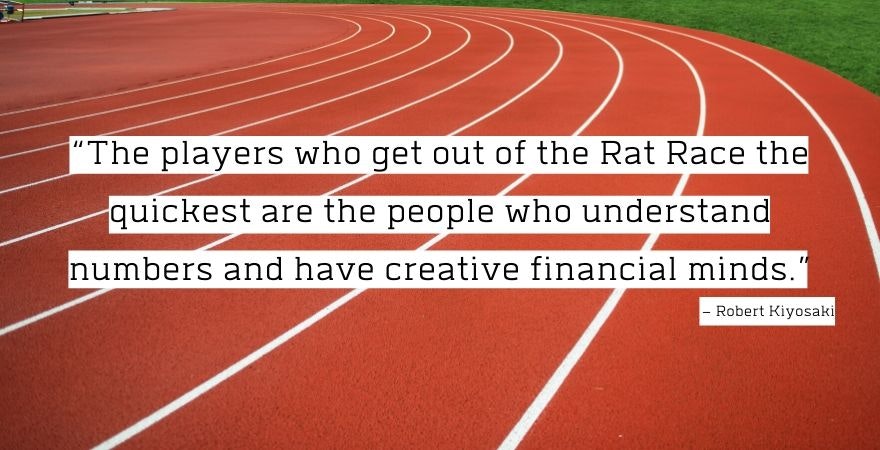
It is possible to have the money yet still struggle to move ahead financially.
Some people have a great opportunity present itself only to fail to have enough money to take advantage of it. Others have a fantastic opportunity present itself only to lack the ability to recognize that it’s a great opportunity (and they may even have the money to take advantage).
The strategy of the average person is: “Work hard, save, and borrow.” But instead of working hard, they should aim to improve their financial intelligence so that they can make more money. The people who get rich the fastest are those who realize that money isn’t real.
“The single most powerful asset we all have is our mind. If it is trained well, it can create enormous wealth.”
Today, savers are considered losers. The reason for this is because interest rates have never been lower. Plus, banks now charge you for holding your money.
During the stock market crash, Robert Kiyosaki was short of cash as he had his money in the stock market and apartment houses. However, he knew this was the time to buy. He and his wife had about a million dollars to invest in some amazing deals. He decided to shop for houses at the bankruptcy attorney’s office. He asked a friend for a $2,000 loan with a return of $200, so he could buy a $20,000 home that was worth about $75,000. He then ran an ad promoting the house for $60,000. It sold within minutes. He asked for a $2,500 processing fee. Thus, giving his friend his money back without using any of his own money. Thus, earning him a profit of $40,000 with a promissory note. The whole process took him five hours.
At the time Rich Dad Poor Dad was published, there had been three stock market crashes in 30 years.
- 1989-1990: real estate
- 2001-2002: dot-com bubble burst
- 2008-2009: housing bubble burst
All of these stock market crashes were investment opportunities.
Which one sounds harder?
- “Work hard. Pay 50% in taxes. Save what is left. Your savings earn 5%, which is also taxed. OR
- Take the time to develop your financial intelligence. Harness the power of your brain and asset column.”
Most of Robert Kiyosaki’s financial growth comes from real estate and small-cap stocks.
“The problem with ‘secure’ investments is that they are often sanitized, that is, made so safe that the gains are less.”
In one example, Robert Kiyosaki paid $45,000 on the house worth $65,000 that the owner was struggling to sell. The first year he rented it out to a local professor. And after expenses, he nets $40 a month. However, a year later, when the market picked back up, he sold it for $95,000. Since he had used the money to buy a bigger property, a 12-unit apartment, he was able to defer the payment of capital gains. He spent $300,000 on the apartment. And only two short years later sold it for $495,000 and bought a 30-unit apartment building with a cash flow of $5,000 a month. A few years later, he sold it for $1.2 million.
The best deals aren’t usually offered to newcomers. They’re often reserved for the rich. But the more sophisticated you get at the game, the more opportunities you’ll be presented with. Most of Robert Kiyosaki’s millions started with as little as $5,000 or $10,000 investments.
In the past, Robert has bought 100,000 shares at 25 cents a share before a company goes public. Then, the company goes public, and whether it’s $2 each or if it flies to $20, you can sometimes make a million dollars in less than a year.
“It’s not gambling if you know what you’re doing. It’s gambling if you’re just throwing money into a deal and praying.”
Robert Kiyosaki shares, “Most people never win because they’re more afraid of losing. That is why I found school so silly. In school, we learn that mistakes are bad, and we are punished for making them. Yet if you look at the way humans are designed to learn, we learn by making mistakes. We learn to walk by falling down. If we never fell down, we would never walk.”
People’s fear of losing causes them to not be rich. “People who avoid failure also avoid success.”
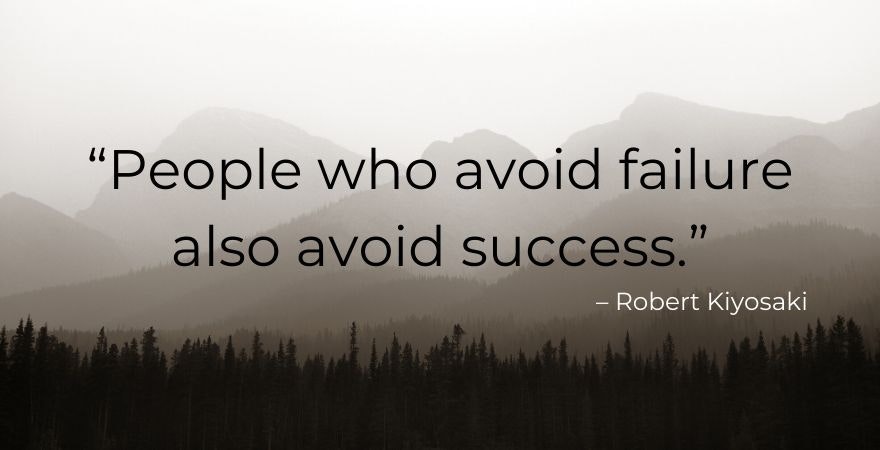
Three skills of an investor:
- Find an opportunity that everyone else missed: see with your mind instead of your eyes
- Raise money: know how to raise capital outside of a bank
- Organize smart people: hire people more intelligent than you
“Job security meant everything to my educated dad. Learning meant everything to my rich dad.”
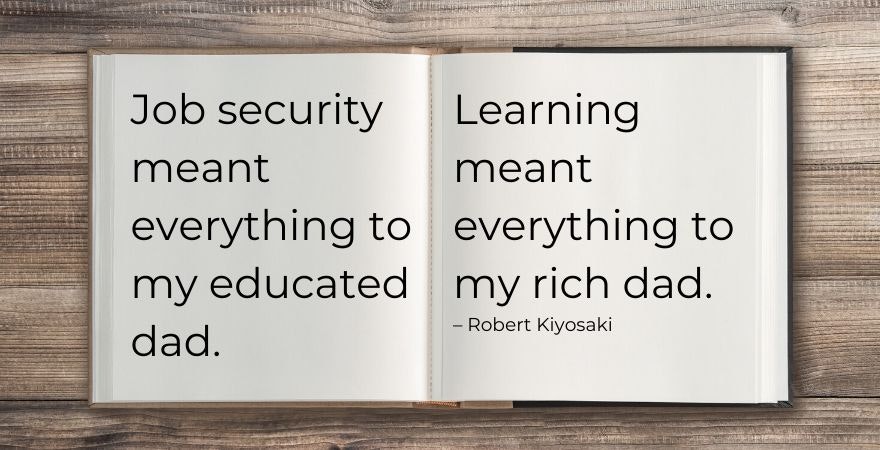
During an interview with a journalist, Robert Kiyosaki learned that the journalist strived to become a best-selling author. He realized she was a great writer and that she should pursue that. She told him that she had tried, but no one was interested. He accidentally offended her when he told her to take a sales course so she could promote herself. She became defensive.
She replied, “I have a master’s degree in English literature. Why would I go to school to learn to be a salesperson? I am a professional. I went to school to be trained in a profession, so I would not have to be a salesperson. I hate salespeople. All they want is money.” She packed her things. Robert Kiyosaki gently pointed out that he was the best-selling author, not the best-writing author. This statement only infuriated her more, and the interview ended.
The world has many successful and talented people: doctors, lawyers, dentists. And still, they struggle financially. But as a wise business consultant once said, “They are one skill away from great wealth.” If you took your skillset and paired it with financial intelligence, accounting, investing, marketing, or law, you could achieve great wealth.
If that journalist had instead picked up a job at an ad agency to learn how to sell, she could go on to create great wealth with her writing.
Rich dad says, “You want to know a little bit about a lot.” In school and at work, you’re expected to specialize. Those who earn promotions tend to be specialists. However, Robert Kiyosaki’s rich dad always recommended the opposite. That’s why, throughout the years, Robert would work in different areas of his rich dad’s company. He was expected to attend meetings with lawyers, bankers, accountants. It was essential to the rich dad for Robert to know every aspect of creating an empire.
When Robert Kiyosaki had quit his high-paying job, his poor dad had a heart to heart talk with him, failing to understand his mindset for quitting.
Poor dad: values job security
Rich dad: values learning
Poor dad: assumed Robert went to school to learn how to be a ship’s officer
Rich dad: knew Robert went there to study international trade
The reason Robert had quit his job was so that he could learn how to lead people as his rich dad said, “If you’re not a good leader, you’ll get shot in the back, just like they do in business.”
“Job is an acronym for ‘Just Over Broke.’”
Robert Kiyosaki recommends taking on jobs where you can learn new skills instead of jobs that pay the most.
The biggest fear for aging Americans is running out of money before they die. When you add up health costs and long-term nursing home care, it’s quite likely that the average American will run out of money during their retirement.
“Are workers looking into the future or just until their next paycheck, never questioning where they are headed?”
The best advice Robert Kiyosaki has for those looking to earn more money is to pick up a second job that’ll teach them a second skill.
It’s normal to feel a bit of resistance to that idea; you might not be excited to do something you aren’t passionate about. But remember, you go to the gym not because you want to but because you want to be healthy and live a long life.
Robert shares the story of an artist in Hawaii who inherited $35,000. He used the money to run ads in an expensive magazine that targeted the rich. However, not a single person reached out. He lost his entire savings. The artist is now trying to sue the magazine for misrepresentation. However, the reality is that he didn’t have any advertising experience. When Robert asked this artist if he’d be interested in taking a course, he said, “I don’t have the time, and I don’t want to waste my money.” Most people focus on improving their product rather than learning how to sell it.
Management Skills Needed for Success:
- Management of cash flow
- Management of systems
- Management of people
“The most important specialized skills are sales and marketing.”
Robert Kiyosaki’s friend Blair Singer shares, “Sales = Income. Your ability to sell– to communicate and position your strengths– directly impacts your success.”
Most people fear rejection, which is why they’re often intimidated by sales and marketing.
Law of Money: “Give, and you shall receive.”
Robert shares, “In conclusion, I became both dads. One part of me is a hard-core capitalist who loves the game of making money. The other part is a socially responsible teacher who is deeply concerned with this ever-widening gap between the haves and the have-nots. I personally hold the archaic education system primarily responsible for this growing gap.”
“The primary difference between a rich person and a poor person is how they manage fear.”
There are five core reasons why even the financially literate don’t become financially independent:
Not even the rich, like losing money. No one does really. Rich dad says, “Some people are terrified of snakes. Some people are terrified of losing money. Both are phobias.” That’s why it was so crucial for Robert’s rich dad to teach his two sons how to take risks at a young age. The younger you are, the easier it is to become rich.
Approach risk like a Texan. Texans both win big and lose big. Their attitude is what’s game-changing. They feel a sense of pride when they win, but they still brag even if they lose. They lack a fear of loss. Their loss inspires them.
Before you win, you lose. Like all those times you fell off a bicycle before you learned how to ride it. Before people became rich, they lost money. Most people are more afraid of the pain of losing money than the happiness of becoming rich.
“Rich dad knew that failure would only make him stronger and smarter.”
Losers are defeated by loss. Winners are inspired by loss. You can still hate losing without being afraid of it.
Most people invest in low-yield mutual funds because it’s the safe thing to do. But that’s not the portfolio of a winner.
To be successful, you’ll need to be focused, instead of balanced.
FOCUS: Follow One Course Until Successful
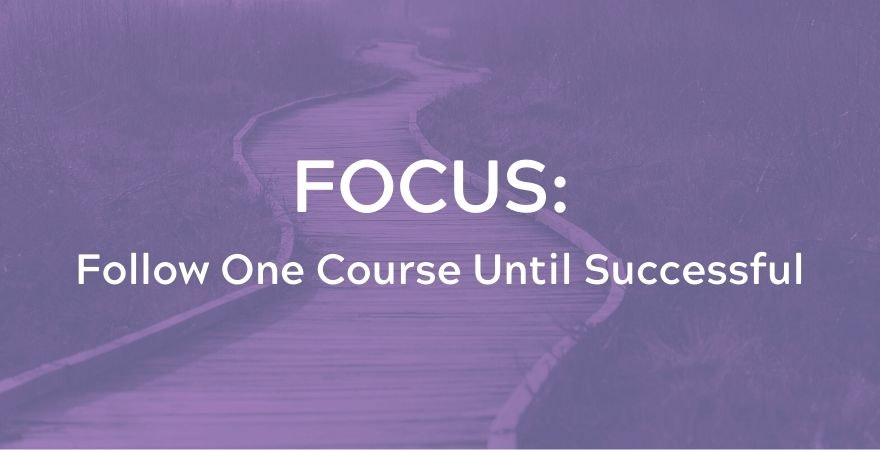
Don’t let doubt cause you not to act. Avoid remarks from friends and family, such as, “‘What makes you think you can do that?’ ‘If it’s such a good idea, how come someone else hasn’t done it?’ ‘That will never work. You don’t know what you’re talking about.’”
Investors know that when it’s a period of doom and gloom, that’s the best time to make money.
Robert’s friend Richard recently asked him for advice on buying property. The two of them identified a two-bedroom townhouse for only $42,000. Others at the time were selling for $65,000. He bought it. But after talking to a neighbor, he backed out, thinking he got a bad deal. A short few years later, the property was worth $95,000. And Richard’s small investment of $5,000 could’ve helped him get out of the Rat Race. Doubt can be a deal killer.
When it comes to financial education, you need to know the difference between good debt and bad debt. Analyze instead of criticizing.
Most people say they’re too busy to focus on their wealth and health, but really they’re avoiding it.
“Rich dad believed the words ‘I can’t afford it’ shut down your brain. ‘How can I afford it?’ opens up possibilities, excitement, and dreams.” Instead of buying his kids everything they wanted, rich dad asked them to think about how they can afford it. Rich dad never gave Robert or Mike anything. The boys had to pay for college on their own.
The financial struggle often comes from bad habits. You need to pay yourself first. Otherwise, you likely won’t be left with anything after paying your bills. That’s because if you pay yourself first and fail to have enough money left over for bills, you’ll need to find new ways to earn more money. It becomes a motivator – especially when debt collectors start calling.
“What I know makes me money. What I don’t know loses me money.”
A gold miner in Peru once told Robert Kiyosaki, “There is gold everywhere. Most people are not trained to see it.”
Robert said this was also true for him in real estate. He said he could find about four to five excellent properties a day, whereas others may look and find none.
10 Steps to Develop Your God-given Powers
- A young woman who dreamed of going to the Olympics would swim every morning for three hours before going to school. She also spent her weekends studying to maintain high grades. When asked why, she responded, “I do it for myself and the people I love. It’s love that gets me over the hurdles and sacrifices.”
- With every dollar we receive, we choose whether we become: rich, poor, or the middle class. However, you need to train your children to know how to manage your assets. Otherwise, they’ll be lost in the next generation.
- It’s important to learn how to invest before investing.
- You don’t have to choose friends based on their financial statements.
- Choose friends who talk about money and are interested in the subject.
- People with money often report that their friends without money never ask them how they did it. But they do ask for: a loan or a job.
- Study what you want to do. For example, if you want to be a cook, study cooking.
- If you want to make money, don’t work for it.
- Most people learn but fail the most crucial step: action.
- It’s not what you know but how fast you learn.
- Without self-discipline, you wouldn’t know how to manage a million dollars if you were to receive it.
- You’ll only get pushed around in life if you lack self-discipline and internal control.
- Personal time
- People who pay themselves first end up using the money to acquire assets that pay for their expenses, and then they’re leftover is income. People who pay themselves last, lose all their money with expenses.
- Even if your cash flow is far less than your bills, you need to pay yourself first.
- Robert Kiyosaki has more liabilities than most of the population, but he uses tenants to pay for his debts.
- “Don’t get into large debt positions that you have to pay for. Keep your expenses low.”
- Don’t dip into your savings when pressure builds. Use the pressure to find new ways of making more money.
- Savings need to be used to make more money instead of paying bills.
- Pay professionals well and have expensive attorneys, accountants, real estate brokers, and stockbrokers. Their services should be making you money. Those professionals who make more will also make you more money.
- Poor people will often tip restaurant servers 15-20 percent even with lousy service but get mad when they need to pay a broker three to seven percent.
- Have a board of directors; it’s essential to have people working for you who are smarter than you.
- “The sophisticated investor’s first question is: ‘How fast do I get my money back?’ They also want to know what they get for free, also called a ‘piece of the action.’ That is why the ROI, or return on investment, is so important.’
- When Robert Kiyosaki wanted to buy a small condominium in foreclosure, he submitted a bid $10,000 less than asking. But since he presented a cashier’s check with the full amount, the bank knew it was a serious deal and accepted it. After three years of renting out the property, Robert Kiyosaki officially owns the asset, which continues to make him money.
- When you acquire an investment, you should aim to get something free with it– for example, a condominium, a piece of land, stock shares, etc.
- McDonald’s founder, Ray Kroc, wanted the land underneath every McDonald’s location for free with every franchise he opened
- A father wanted to teach his child how to make money. His son had been asking for a car but didn’t want him spending his college money on it. His father gave him $3,000 that the son could use to buy a vehicle indirectly. So he couldn’t use the cash to buy a car. His son started learning how to invest in stocks. He read every book, he read publications, and even though he lost $2,000 in the stock market, his interest had been piqued.
- Don’t buy luxuries with liabilities like credit, buy them from your asset column
- 80 would have spent it all or gone further in debt
- 16 would’ve increased the amount by 5-10 percent
- Four would have either doubled it or grew it to the millions
- Robert Kiyosaki’s heroes are Warren Buffett, Peter Lynch, George Soros, etc.
- When Robert Kiyosaki analyzes a deal, he tries to look at it the same way Warren Buffett would. This strategy helps him tap into raw genius.
- Robert’s rich dad taught him to be charitable. His poor dad taught him to give away his time and knowledge, but not money.
- Rich dad says, “If you want something, you first need to give.”
- If you want money, give money.

Stop doing what you’re doing.
- If it’s not working, try something new.
Look for new ideas.
- Read how-to books with formulas on topics you want to learn more about.
- Read: The 16 Percent Solution by Joel Moskowitz
Find someone who has done what you want to do.
- Find the expert who has done something you want to do and pick their brain so you can learn from them.
Take classes, read, and attend seminars.
- Many classes are free or low cost, search the internet for them so you can absorb more knowledge.
Make lots of offers.
- Robert submits offers on multiple real estate properties that he wants. He leaves the deal up to the real estate agent, who is the expert, whereas he isn’t.
- Most sellers ask for too much money, and until there’s a second offer, it’s hard to know what the right price is.
- You’d be surprised at how many people would say yes to an offer.
Jog, walk, or drive a certain area once a month for ten minutes.
- You’ll find some of the best real estate investments by driving around. He might talk to postal workers, moving truck workers, retailers, and so forth to better understand a neighborhood.
Shop for bargains in all markets.
- “Profits are made in the buying, not in the selling.”
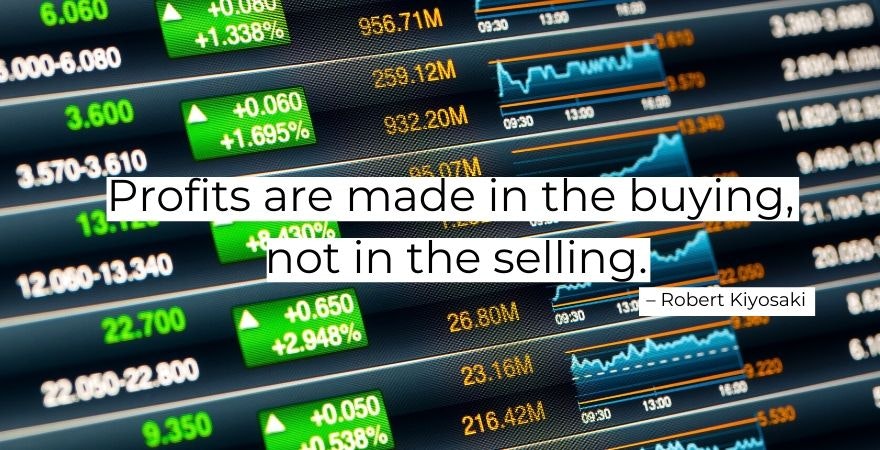
Look in the right places.
- Most people buy with real estate agents. Robert Kiyosaki buys at the foreclosure auction.
Look for people who want to buy first. Then look for someone who wants to sell.
- When buying property, find a seller first then find a person who’s looking to sell their property and buy through them.
- If your business is buying something in bulk, call some friends up to see if they’re looking for that as well. Then, you can negotiate deals for having a large bulk purchase, so you get the best deal on what you’re buying.
Learn from history.
- “All the big companies on the stock exchange started out as small companies.”
Action always beats inaction.
Robert’s friend was once trying to save up for his four children’s college educations. But with only $12,000. It was clear it wasn’t going to happen any time soon. He advised his friend to buy a property in Phoenix since there was a slump in the market. After two weeks, they found a three-bedroom, two bathroom home in a good area. The homeowner was desperate to sell. They ended up buying the property for $79,000, even though the owner wanted $102,000. His friend needed a down payment of $7,900. Each month after all expenses were paid, his friend pocketed $125. He planned to keep the house for 12 years. He used his $125 to pay down the mortgage even faster. Three years later, someone offered him $156,000 for the house. Robert advised him to sell it using a 1031 tax-deferred exchange. Next, he bought a mini-storage facility. After three months, he was making $1,000 a month that he put into the college fund. A couple of years later, he sold that mini-warehouse for close to $330,000. His next investment made him $3,000 a month in income, going back to the college fund. The man now feels confident in his ability to pay for his children’s college education. And it all started with only $7,900.
There are three types of income
- Ordinary earned
Poor dad: ordinary earned, get a safe and secure job
Rich dad: portfolio and passive, make money work for you
“The key to financial freedom and great wealth is a person’s ability to convert earned income into passive and/or portfolio income.”
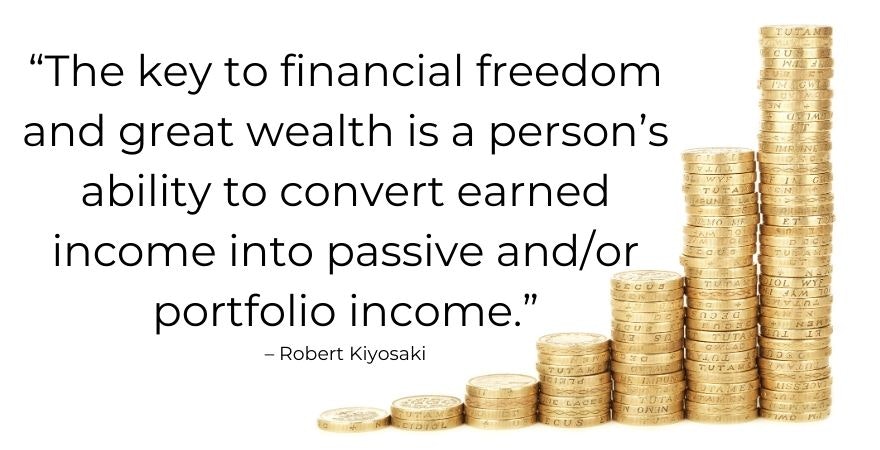
Warren Buffett advises that “Risk comes from not knowing what you’re doing.”
Rich dad would often say, “If you want to be rich, you must know what kind of income to work hard for, how to keep it, and how to protect it from loss. That is the key to great wealth… If you do not understand the differences in those three incomes and do not learn the skills on how to acquire and protect those incomes, you will probably spend your life earning less than you could and working harder than you should.”
Your destiny relies on how you spend your money and your time. Your family’s future will be determined by your choices today.
You can buy Rich Dad Poor Dad by Robert Kiyosaki on Amazon .

How To Make Money on YouTube: 9 Top Tips
Want to learn how to make money on YouTube? Good idea. YouTube offers tons of opportunities to convert views into cash—…

How To Be Successful in 2024: 10 Tips To Win Big
Want to learn how to be successful? We’ve got a formula: Stop Looking for the Silver Bullet | Start Creating Better Goa…

10 Smart Goal Examples (and How to Use Them)
SMART goals are Specific, Measurable, Achievable, Relevant, and Time-Bound. See 10 examples and learn to write your own.
Oberlo uses cookies to provide necessary site functionality and improve your experience. By using our website, you agree to our privacy policy.
- Skip to primary navigation
- Skip to main content
- Skip to primary sidebar
- Skip to footer

My Honest Rich Dad Poor Dad Review 2024
Updated: May 15, 2024 by Bonnie (Ling) Thich 27 Comments
Sharing is caring! ʕっ• ᴥ • ʔっ ♥

We will receive a commission if you make a purchase through our affiliate link at no extra cost to you. Please read our disclosure policy for more information.
I’ve read many personal finance books and several of my favorites include The Intelligent Investor, The Automatic Millionaire, I Will Teach You To Be Rich, The Millionaire Next Door , and How Rich People Think .
Being a fan of Warren Buffett and his insightful financial quotes , I initially wanted to read Warren Buffett: 43 Lessons for Business & Life.
However, given the plethora of books available and knowing that Rich Dad Poor Dad stands out as one of the most popular personal finance books, I chose to read it next.
I have to say it was a good read, so today I am going to write about my honest review of Rich Dad Poor Dad.
Rich Dad Poor Dad is a book written by Robert T. Kiyosaki and published in 1997.
Honestly, it was on my to-read list for the longest time, but I never got to it until more recently (I actually read this several years ago since my last update in this post for 2024). I’d like to thank one of my subscribers who encouraged me to read this book because she was curious about my thoughts on it.
The first thing I asked myself was, “ Why didn’t I read this book sooner?”
I could’ve been many millions or even billions of dollars richer in my 20s ! Ha, just kidding!
But all jokes aside, it surely would’ve made a HUGE difference to my life if I had just read this book earlier! Well, better now than never, right?
Related posts about building wealth:
- How To Become a Millionaire in Your 20s and 30s: How I Accumulated My First Million Dollars in Net Worth By Age 33
- How To Get Out of Debt: How I Paid Off $70,000 in Student and Car Loans
- Earn Extra Money: How I Made Over $1,000,000 with These Side Hustles (Outside of my 9-5 Job)
Rich Dad Poor Dad Book Review
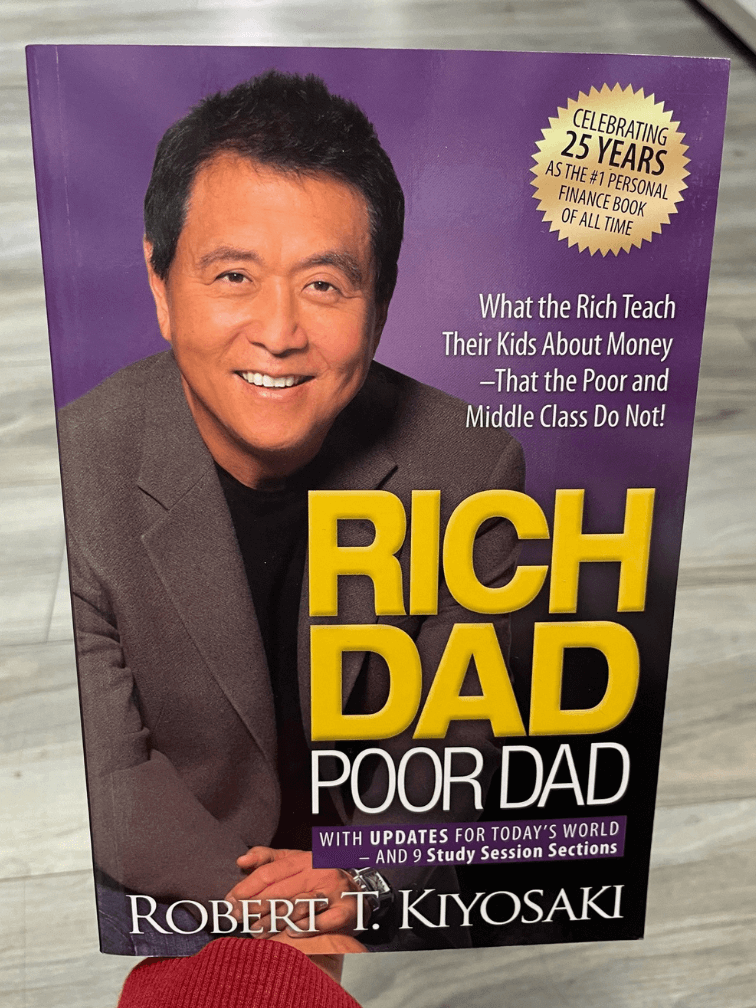
The beginning of the book was my favorite because it started off with the story of Kiyosaki’s childhood and how he and his best friend, Mike, wanted to learn how to become rich! For his entire life, Kiyosaki has observed the differences between his rich dad (Mike’s dad) and his poor dad (his biological dad).
In short, the book may not provide concrete personal finance tips, but it offers motivation and inspiration to get you thinking.
Not just that, but it will also change your mindset on how you view money. Kiyosaki emphasizes a huge difference between having money work for you versus you working hard for your money.
And no, he doesn’t give you the typical advice of investing your savings in the markets and letting them grow over time. Though that is sound advice, Kiyosaki emphasizes more on “thinking big and bold! Don’t be a Chicken Little!”
My overall rating of Rich Dad Poor Dad:
With that said, I give Rich Dad Poor Dad an overall rating of 4.5/5. I admit there were a couple of parts where I wasn’t able to connect with the author (I mention these points later in the post). But, for the most part, I absolutely agree with his overall view. Not to mention, his passionate and encouraging voice made me love the book even more!
Rich Dad Poor Dad Audiobook
For those interested in audio, you can also check out the Rich Dad Poor Dad audiobook via Amazon here .
The Rich Dad vs. Poor Dad:
As mentioned, the book tells the story of Kiyosaki and his two dads — one rich and one poor.
The poor dad is his biological father who is highly educated. His poor dad believes in pursuing a formal education (i.e., a Bachelor’s, Master’s, Ph.D., etc.), getting into a high-paying company with nice benefits, and working until retirement.
On the other hand, his rich dad (his best friend’s dad) believes in pursuing “financial literacy” through experience and self-learning.
His rich dad is not a fan of formal education, nor does he take the linear approach to making money (i.e., hourly wage, salary, etc.). His approach is non-linear, smart, and efficient.
Kiyosaki’s rich dad says it’s unfortunate that school doesn’t teach or train us on how we should manage our money to improve our lives.
Generally speaking, we were raised to believe that talking about money is taboo. No one likes to talk about money. And that’s why 57% of Americans don’t have enough savings to cover $1,000 in emergencies . Yikes!
If only we spent as little as 30 minutes per day reviewing our finances and becoming more financially literate, we’d be a million times better off! Imagine the potential to make $1,000 a day just by dedicating some time to understanding our finances better.
Instead, we’re taught (by poor dad) that money is evil, that it’s the root cause of all problems, that it’s here to destroy your life, and that you don’t need much money to live. Blah, blah, blah. Yeah, I’ve heard enough of those excuses.
Rich dad would argue that money is a tool, and it just magnifies who you are. It shouldn’t change or control a person. Instead, it should allow you to buy back time and improve your life.
Lifestyle Inflation:
The book reiterates that we’re just trained to go to school and focus on getting good grades within our field of study. Once that’s done, we hop on board with the masses and work for an employer who pays us a regular salary along with some other nice perks. That’s cool, I suppose, and we’re happy with that (for now)…
But that state of happiness doesn’t last very long.
Kiyosaki says humans by nature are greedy, emotional, and impatient.
So within time, when we get raises or promotions, we end up spending more. The more we make, the more we spend. As a result, lifestyle inflation kicks in, and we have nothing saved in our assets column.
Rich dad says you either end up 1) offsetting your income with your expenses (in most cases, the poor), or 2) building up your liabilities column (usually the middle-class because they get themselves into debt so that they can buy more of what they think makes them happy).
It’s a never-ending paycheck-to-paycheck cycle and we eventually want more and more.
But what the masses don’t understand or see is that they cannot sustain this inflated lifestyle because they’re working hard (and not smart) for their money .
Rich dad says the cycle typically goes like this:
Get paycheck —> spend —> eventually get promoted and paid more —> spend more (e.g., upgrade to bigger houses, cars, boats, vacations, etc.) —> no assets that generate income for you
And the end result?
Hmm, I guess there is no end…
The masses become trapped in the “Rat Race” with no savings and no investments.
According to Yahoo Finance, over 65% of Americans don’t have a penny for emergency savings, and more than half could end up struggling in retirement.
If you really want to get out of the hamster wheel, consider these passive income ideas here . Honestly, anyone can start with NO experience. You don’t need a college degree either!
Your home is not an asset. It is a liability.
Speaking of savings and investments, Kiyosaki does not consider your primary residence an asset. In his view, if your home carries a mortgage and does not generate any income, then it is not an asset but a liability. The same applies to your financed vehicles. In the end, he’s saying that you’re just borrowing to consume .
In my personal opinion, your house is considered an asset if:
1) It generates an income stream and/or
2) If you are set on selling it down the road and using that money to invest in growth and/or income-generating assets.
In some cases, people have their mortgage paid off but never plan to sell because they are set on living there forever. In this case, I personally wouldn’t consider this an investment either because, again, it would only be used for consumption . Also, for the sake of simplicity, we will not assume any HELOCs or the use of debt to make money either.
Earning power comes with your knowledge, not your degree.
In my personal experience, I was taught by my dad (another poor dad) to do what everyone else (i.e., the masses) does in order to succeed in life. By the way, my dad knows he’s poor, and he calls himself poor all the time , so I have no shame writing this.
Unfortunately, I learned it the hard way, and I honestly wish I was more “financially literate” and exposed to personal finance and self-development books when I was still in school. But I only have myself to blame.
Related post: How To Really Save Money When You’re Poor (Living on a Low Income)
So, here’s my advice to you:
No matter what financial stage you’re in, I strongly recommend you to beef up your education in “financial literacy” if you’re aspiring to build wealth or become rich.
Do not, and I repeat, DO NOT stop learning once you’re done with school. The day you graduate from University should be the beginning of your real learning journey, not the end. While you’re acquiring new knowledge, you also need to apply what you learned. Even if it means taking a little bit of risk sometimes.
Here’s what Robert Kiyosaki said in the book:
“Once we leave school, most of us know that it is not so much a matter of college degree or good grades that count. In the real world, outside the academics, something more than just grades is required. I have heard it called many things; guts, chutzpah, balls, audacity, bravado, cunning, daring, tenacity, and brilliance. This factor, whatever it is labelled, ultimately decides one’s future much more than school grades do.”
5 Reasons Why You Won’t Be Rich
Aside from the points I mentioned above, one of my favorite parts of Rich Dad Poor Dad was near the end when Kiyosaki writes:
“Once people have studied and become financially literate, they may still face roadblocks to becoming financially independent.”
Answer: People may still not be able to build wealth because of the following five reasons:
- Fear (this one is my favorite, which I will discuss more in the next section)
Rich Dad Poor Dad Quotes
I was inspired by many of the money and financial quotes in Rich Dad Poor Dad .
This section, especially his point about fear, caught my attention because I can see that far too many people are “Chicken Little” about everything in life. This is especially true when it comes to losing money.
“For most people, the reason they don’t win financially is because the pain of losing money is far greater than the joy of being rich.”
People generally like to play it safe, and that’s why they’ll never see gains.
Kiyosaki says you can play it safe and never lose a dime, but don’t expect to win either.
He went on to say that most people are afraid of losing, so they lose. Those who take risks aren’t afraid to lose because they know that in order to win, you have to lose. In other words, winners are not afraid of losing.
Here’s one of my favorite quotes from the book:
“Failure inspires winners. Failure defeats losers.”
After finishing Rich Dad Poor Dad , this point was my biggest takeaway because I was able to relate to it. I admit that there are things I fear in life—we all do—but I’ve been diligently working on them to let them go.
Rich Dad Poor Dad Criticism
Overall, the book got me very excited, and I absolutely loved it!
But, there were parts of the book I just wasn’t so fond of . At times, I just didn’t feel like I was in sync with him. Maybe because my mindset isn’t the same as his when it comes to certain ideas.
For one, he is mainly biased towards real estate investing and small-cap stocks. Secondly, he’s not a fan of buying blue-chip stocks or funds (though he didn’t say it was a bad thing).
Now, I’m not against real estate investing or small-cap stocks (I actually have an interest in both). But, he made it sound like it was child’s play!
In the book, Kiyosaki gave a lot of examples of his experience with real estate investing.
For example, he mentioned a real estate deal where he made $50,000 within five hours without putting in much effort. Like, come on! Both you and I know that the majority of people are not “sophisticated” investors, so they can’t relate to those types of examples.
My question to him was: So, how can I replicate your success? Where do I even start?
He also mentions that it’s the mind that sees opportunities, and not the eyes. I understand where he’s coming from in terms of the mind. But again, I just didn’t like how he made it sound so simple.
Ask Yourself Open-ended Questions
Despite some personal examples that I couldn’t relate to directly, I still had a great time reading the book. There were still so many nuggets of wisdom that I still bring with me to this day. Trust me, as long as your mind is open, you will be motivated to think outside the box and ask, How can I become happy and rich? How do I escape this rat race?
Many people get discouraged easily, especially when they feel like their efforts aren’t giving them the results they want. That makes it easy for us to think, “I can’t.” But with this book, you will start viewing your obstacles as open-ended questions.
I believe that this piece of knowledge is the most important thing you can learn from the book. For example, instead of thinking, “I can’t afford this,” you should start asking yourself, “ How can I afford this? ”
The key here is avoiding any negative talk. Start reframing your thoughts into questions. That way, your mind will start looking for answers and opportunities to solve your problems. Once you get used to this mindset, you’ll realize that you were just limiting yourself all along.
Rich Dad Poor Dad Review Summary
Rich Dad Poor Dad is not a guide to managing your personal finances, but it will motivate and inspire you to take action.
It also gives you a lot of insights into the key differences between having money work for you versus you working for your money. You need to know that the latter will NEVER make you rich, even if you’re earning over $100 per hour.
In the book, you’ll also spot the huge differences in behaviors of the rich (i.e., rich dad) versus the poor and middle-class (i.e., poor dad).
Here’s a recap of some differences:
- formal education vs. self-education. Not to say that formal education is bad, but most people stop learning at that point.
- being able to distinguish an asset from a liability
- asset column vs. debt column. Which column are you going to build?
- instant gratification vs. patience
- fear of losing vs. being unafraid of losing (i.e., joy of winning)
- negatively stating “I can’t afford this” instead of asking “How can I afford this?”
“If you don’t go through life with an open mind, you will find a lot of closed doors.”
Don’t wait like I did. I honestly wish I read this book sooner than later.
You can click on the book to learn more from Amazon. Change your mindset about money today!
You can also purchase the e-book version on Amazon when you download the FREE Kindle reading app here . You can read Kindle e-books from any device including your PC, smartphone, tablet, etc.
FAQs About Rich Dad Poor Dad
Many people have questions about Robert Kiyosaki’s best-selling book, ‘Rich Dad Poor Dad,’ so I’ll answer the most frequently asked ones here.
1. Is Rich Dad Poor Dad actually worth reading?
“ Is Rich Dad Poor Dad worth reading ?” is a common question that I get. If you look at Rich Dad Poor Dad reviews online, you’ll see that there are varying thoughts on it, but it’s still hailed as a must-read for people who want to learn more about personal finance and wealth-building.
From my perspective, it’s worth reading so you can have a different look at the whole financial education talk. I already have a solid foundation on personal finance when I read this book, but I still found myself gaining an improved mindset and belief system.
Some might argue that it lacks depth or detailed financial guidance, but many people who have read the book rave about the foundational ideas and insights it gives.
But if I have to be honest, the only way you’ll know if it’s worth reading is if you try it yourself. What someone else finds not worth it might be worth it for you. We all have different thoughts about the book, so it’s best for you to formulate your own.
2. Does Rich Dad Poor Dad actually teach you anything?
If you’re expecting a step-by-step guide on personal finance, let me tell you that you won’t think this book is worth it. It doesn’t go into how you can make a budget or how to change your bad money habits . But does that mean the book won’t teach you anything?
While it’s not a detailed guide, it can teach us a lot. It provides us with insights into financial philosophies that help us shift our money mindset. The book has a lot of ideas that many people would disagree with, which is exactly the reason why you’re going to learn a lot from it. We can’t learn from something that we already know or agree with.
One way he challenges a widely accepted belief is by saying that a home, most people’s biggest investment, is not an asset. This perspective shifts the conventional understanding of a “dream home.”
Instead, Kiyosaki talks about how important it is to buy things that can make you money, like houses or apartments you can rent out (not for consumption). He says it’s better to choose these kinds of properties that give you steady money over the expensive ones that just cost more to keep up.
He also warns about the trap of borrowing money to buy things that lose value fast, like fancy cars on loan.
Again, The book doesn’t give you step-by-step advice on how to invest, but it teaches you a different way to think about money and what you own. It does a great job of encouraging you to aim for real, lasting wealth instead of just buying expensive stuff just to keep up with the Joneses and please people who don’t even care about you.
3. Is Rich Dad Poor Dad still valid?
Although the book was written in 1997, it remains a timeless classic. My book review of Rich Dad Poor Dad proves that it has pieces of advice that are still relevant in today’s world.
Since it’s not a detailed guide and mostly talks about general money philosophy, it’s easy to incorporate the ideas into what’s currently happening. Our understanding of money from mainstream media is already carved into our minds since it was passed down from generation to generation, so the fact that this book defies the general public’s idea of wealth means that it will continue to challenge us to understand modern financial dynamics deeper.
4. What are the six lessons in Rich Dad Poor Dad?
This Rich Dad Poor Dad book review touches on many valuable lessons on personal finance imparted to us by the book. But it’s these six lessons that you should focus on implementing in your life:
- Prioritize making passive income over earned income. The rich make money work for them.
- It’s crucial to have financial literacy. If you know basic terms like assets, liabilities, and cash flow, you can make more informed financial decisions.
- Your top priority should be your personal financial growth.
- Taxes have a history, and the wealthy often benefit from understanding how to use corporate structures.
- Rich people create their own opportunities.
- If you want to be rich, you have to prioritize continuous learning. Acquire various skills to gain a stronger foundation for wealth-building.
Over to you, readers, what do you think of this Rich Dad Poor Dad review ? Have you read Rich Dad Poor Dad ? Are you open-minded about the things he says? What do you think?
Did you enjoy this post? If so, don’t forget to spread the love on Pinterest! 🙂
About Bonnie (Ling) Thich
I am passionate about finding ways to save, budget, and earn more. I always dreaded the traditional 9-5 job, and that pain really motivated me to start building a better relationship with my money so I could achieve financial freedom sooner. I woke up one day, and randomly started FinSavvyPanda.com (with no knowledge about blogs, websites, or whatsoever) where I share my financial and blogging journey to help you save, budget, and earn more. Fast forward 12 months, I was so surprised about earning a full-time income with my small blog , which allowed me to quit my job! I'd love to help you start your blog too, so you can do what you love and live on your own terms! You can click here to learn how you can start a profitable blog for beginners .
Reader Interactions
April 18, 2018 at 5:08 pm
For some reason, I had it in my head that Rich Dad Poor Dad was just a book pushing MLMs. I don’t know why, maybe it has to do something with the author’s seminars?
I think I’ll put it on my to-read list. Thanks for the review!
April 17, 2018 at 12:33 am
Hi Panda! I read this book many moons ago, didn’t remember much! I guess it didn’t have as much as an impact as the wealthy barber on me! Great review:)
April 14, 2018 at 12:37 am
Hey, Panda! I had no desire to read this book, but after reading this post, I need to check it out! I read Your Money or Your Life and The Millionaire Next Door recently and didn’t think any other book was necessary haha. But it sounds like he lays out a lot of great ideas, especially on lifestyle inflation. That is my down fall!
April 13, 2018 at 3:12 pm
Great review, and reminder of a good mindset. It’s very easy to fall into the rat race and forget you’re even there. I have not read the book, but I agree with most of these conclusions.
I’ve found that the rat race can be exciting at first, but that luster quickly fades as you contemplate decades of cubicle land (unless you really love your job). Even highly-paid jobs can turn out to be unsatisfying.
Thanks for the review, the book is moving up in my reading list!
Cheers, Miguel
April 13, 2018 at 9:02 pm
It is easy to fall into the rat race trap! I remember when I was in school, I said to myself “oh, I’ll be happy as long as I make $50,000 for the rest of my life.” I thought all there was to life is work and just spend whatever you make to pay bills. Boy, I was such a naive student (I also listened to my poor dad, lol). I actually didn’t think much about it at that time.
Now, after going to work and seeing how the real world is, my mindset is totally different! I’m thinking there’s so much more to life than this work-and-consume cycle.
And yes, I agree that we are happy initially but then it fades once we realize something is missing (unless you really love your job)! But, I don’t think I’ll ever understand that “I love my job” feeling lol.
Definitely, take a read! It opened up my eyes even more! 🙄
Leave a Reply Cancel reply
Your email address will not be published. Required fields are marked *
Finsavvypanda.com is a participant in the Amazon Services LLC Associates Program, an affiliate advertising program designed to provide a means for sites to earn advertising fees by advertising and links to Amazon.com. Privacy policy . Disclaimer . Terms & Conditions .
Forgotten password
Please enter the email address that you use to login to TeenInk.com, and we'll email you instructions to reset your password.
- Poetry All Poetry Free Verse Song Lyrics Sonnet Haiku Limerick Ballad
- Fiction All Fiction Action-Adventure Fan Fiction Historical Fiction Realistic Fiction Romance Sci-fi/Fantasy Scripts & Plays Thriller/Mystery All Novels Action-Adventure Fan Fiction Historical Fiction Realistic Fiction Romance Sci-fi/Fantasy Thriller/Mystery Other
- Nonfiction All Nonfiction Bullying Books Academic Author Interviews Celebrity interviews College Articles College Essays Educator of the Year Heroes Interviews Memoir Personal Experience Sports Travel & Culture All Opinions Bullying Current Events / Politics Discrimination Drugs / Alcohol / Smoking Entertainment / Celebrities Environment Love / Relationships Movies / Music / TV Pop Culture / Trends School / College Social Issues / Civics Spirituality / Religion Sports / Hobbies All Hot Topics Bullying Community Service Environment Health Letters to the Editor Pride & Prejudice What Matters
- Reviews All Reviews Hot New Books Book Reviews Music Reviews Movie Reviews TV Show Reviews Video Game Reviews Summer Program Reviews College Reviews
- Art/Photo Art Photo Videos
- Summer Guide Program Links Program Reviews
- College Guide College Links College Reviews College Essays College Articles
Summer Guide
College guide.
- Song Lyrics
All Fiction
- Action-Adventure
- Fan Fiction
- Historical Fiction
- Realistic Fiction
- Sci-fi/Fantasy
- Scripts & Plays
- Thriller/Mystery
All Nonfiction
- Author Interviews
- Celebrity interviews
- College Articles
- College Essays
- Educator of the Year
- Personal Experience
- Travel & Culture
All Opinions
- Current Events / Politics
- Discrimination
- Drugs / Alcohol / Smoking
- Entertainment / Celebrities
- Environment
- Love / Relationships
- Movies / Music / TV
- Pop Culture / Trends
- School / College
- Social Issues / Civics
- Spirituality / Religion
- Sports / Hobbies
All Hot Topics
- Community Service
- Letters to the Editor
- Pride & Prejudice
- What Matters
All Reviews
- Hot New Books
- Book Reviews
- Music Reviews
- Movie Reviews
- TV Show Reviews
- Video Game Reviews
Summer Program Reviews
- College Reviews
- Writers Workshop
- Regular Forums
- Program Links
- Program Reviews
- College Links
Rich Dad vs Poor Dad for Teens Book Review
Rich Dad vs Poor Dad for Teens is a truly eye-opening book, only one of a few books in my life that I was able to finish in one day and in one sitting. And to my surprise, this astonishing masterpiece by Robert T. Kiyosaki was added into that “one-sitting” collection. Although one might say that it was because it’s only slightly over a hundred pages long, I would argue that while this is true, there are countless other things that make this book so easy to read and helplessly stick to your hands.
I first heard about this book on Instagram when one famous entrepreneur recommended financial books for teenagers. I was always curious to learn about money and how to make it, and this seemed like a perfect opportunity. Upon arriving at my local library, I realized that there was a whole sequence of these “Rich Dad vs Poor Dad” books by Kiyosaki. My eyes were all over the place, trying to pick which one to borrow first. Seeing my struggle, the librarian kindly offered to borrow the whole sequence, saying: “We want you to get rich.” And as soon as I got home, I decided to start off with this one because of its name. I mean I am a teen, and this book says it’s specifically for teens. All cards matched up. I flipped the plastic cover to the first page.
That was probably one of the best decisions of my life. Sitting through the rainy afternoon, I didn’t notice as the time flew by until there were no more pages to flip. The book was an engaging journey that introduced me to the fundamental concepts of financial intelligence that I was previously craving for. Kiyosaki's unique approach involves the contrasting perspectives of two father figures – the rich dad, an entrepreneur known for financial strategies, and the poor dad, a well-educated individual with a stable job but limited financial acumen. This dichotomy sets the stage for a compelling narrative that not only imparts practical financial lessons but also encourages critical thinking about money matters. This inspired me to think about my dad and even which “dad” I want to be when I grow up.

Similar Articles
Join the discussion.
This article has 1 comment.
Favorite Quote: Not all those who wander are lost- J.R.R Tolkien
- Subscribe to Teen Ink magazine
- Submit to Teen Ink
- Find A College
- Find a Summer Program
Share this on
Send to a friend.
Thank you for sharing this page with a friend!
Tell my friends
Choose what to email.
Which of your works would you like to tell your friends about? (These links will automatically appear in your email.)
Send your email
Delete my account, we hate to see you go please note as per our terms and conditions, you agreed that all materials submitted become the property of teen ink. going forward, your work will remain on teenink.com submitted “by anonymous.”, delete this, change anonymous status, send us site feedback.
If you have a suggestion about this website or are experiencing a problem with it, or if you need to report abuse on the site, please let us know. We try to make TeenInk.com the best site it can be, and we take your feedback very seriously. Please note that while we value your input, we cannot respond to every message. Also, if you have a comment about a particular piece of work on this website, please go to the page where that work is displayed and post a comment on it. Thank you!
Pardon Our Dust
Teen Ink is currently undergoing repairs to our image server. In addition to being unable to display images, we cannot currently accept image submissions. All other parts of the website are functioning normally. Please check back to submit your art and photography and to enjoy work from teen artists around the world!

- Business & Money

Enjoy fast, free delivery, exclusive deals, and award-winning movies & TV shows with Prime Try Prime and start saving today with fast, free delivery
Amazon Prime includes:
Fast, FREE Delivery is available to Prime members. To join, select "Try Amazon Prime and start saving today with Fast, FREE Delivery" below the Add to Cart button.
- Cardmembers earn 5% Back at Amazon.com with a Prime Credit Card.
- Unlimited Free Two-Day Delivery
- Streaming of thousands of movies and TV shows with limited ads on Prime Video.
- A Kindle book to borrow for free each month - with no due dates
- Listen to over 2 million songs and hundreds of playlists
- Unlimited photo storage with anywhere access
Important: Your credit card will NOT be charged when you start your free trial or if you cancel during the trial period. If you're happy with Amazon Prime, do nothing. At the end of the free trial, your membership will automatically upgrade to a monthly membership.

Return this item for free
Free returns are available for the shipping address you chose. You can return the item for any reason in new and unused condition: no shipping charges
- Go to your orders and start the return
- Select the return method

Download the free Kindle app and start reading Kindle books instantly on your smartphone, tablet, or computer - no Kindle device required .
Read instantly on your browser with Kindle for Web.
Using your mobile phone camera - scan the code below and download the Kindle app.

Follow the author

Image Unavailable

- To view this video download Flash Player
Rich Dad Poor Dad for Teens: The Secrets about Money--That You Don't Learn in School! Paperback – February 27, 2012

Purchase options and add-ons
- Reading age 12 - 17 years
- Part of series Rich Dad Poor Dad
- Print length 112 pages
- Language English
- Grade level 7 - 9
- Lexile measure 860L
- Dimensions 6 x 0.25 x 9 inches
- Publisher Plata Publishing
- Publication date February 27, 2012
- ISBN-10 1612680305
- ISBN-13 978-1612680309
- See all details

Frequently bought together

More items to explore

Product details
- Publisher : Plata Publishing; 46625th edition (February 27, 2012)
- Language : English
- Paperback : 112 pages
- ISBN-10 : 1612680305
- ISBN-13 : 978-1612680309
- Reading age : 12 - 17 years
- Lexile measure : 860L
- Grade level : 7 - 9
- Item Weight : 4.7 ounces
- Dimensions : 6 x 0.25 x 9 inches
- #78 in Introduction to Investing
- #238 in Personal Finance (Books)
- #4,287 in Children's Books (Books)
Videos for this product

Click to play video

Did he really say this? Book review!
The Mooneys

Rich dad poor dad for teens
Coach Tanisha Marie

About the author
Robert t. kiyosaki.
Robert Kiyosaki, author of Rich Dad Poor Dad - the international runaway bestseller that has held a top spot on the New York Times bestsellers list for over six years - is an investor, entrepreneur and educator whose perspectives on money and investing fly in the face of conventional wisdom. He has, virtually single-handedly, challenged and changed the way tens of millions, around the world, think about money.In communicating his point of view on why 'old' advice - get a good job, save money, get out of debt, invest for the long term, and diversify - is 'bad' (both obsolete and flawed) advice, Robert has earned a reputation for straight talk, irreverence and courage.Rich Dad Poor Dad ranks as the longest-running bestseller on all four of the lists that report to Publisher's Weekly - The New York Times, Business Week, The Wall Street Journal and USA Today - and was named "USA Today's #1 Money Book" two years in a row. It is the third longest-running 'how-to' best seller of all time.Translated into 51 languages and available in 109 countries, the Rich Dad series has sold over 27 million copies worldwide and has dominated best sellers lists across Asia, Australia, South America, Mexico and Europe. In 2005, Robert was inducted into Amazon.com Hall of Fame as one of that bookseller's Top 25 Authors. There are currently 26 books in the Rich Dad series.In 2006 Robert teamed up with Donald Trump to co-author Why We Want You To Be Rich - Two Men - One Message. It debuted at #1 on The New York Times bestsellers list.Robert writes a bi-weekly column - 'Why the Rich Are Getting Richer' - for Yahoo! Finance and a monthly column titled 'Rich Returns' for Entrepreneur magazine.Prior to writing Rich Dad Poor Dad, Robert created the educational board game CASHFLOW 101 to teach individuals the financial and investment strategies that his rich dad spent years teaching him. It was those same strategies that allowed Robert to retire at age 47.Today there are more that 2,100 CASHFLOW Clubs - game groups independent of the Rich Dad Company - in cities throughout the world.Born and raised in Hawaii, Robert Kiyosaki is a fourth-generation Japanese-American. After graduating from college in New York, Robert joined the Marine Corps and served in Vietnam as an officer and helicopter gunship pilot. Following the war, Robert went to work in sales for Xerox Corporation and, in 1977, started a company that brought the first nylon and Velcro 'surfer wallets' to market. He founded an international education company in 1985 that taught business and investing to tens of thousands of students throughout the world. In 1994 Robert sold his business and, through his investments, was able to retire at the age of 47. During his short-lived retirement he wrote Rich Dad Poor Dad.
Customer reviews
Customer Reviews, including Product Star Ratings help customers to learn more about the product and decide whether it is the right product for them.
To calculate the overall star rating and percentage breakdown by star, we don’t use a simple average. Instead, our system considers things like how recent a review is and if the reviewer bought the item on Amazon. It also analyzed reviews to verify trustworthiness.
Reviews with images

- Sort reviews by Top reviews Most recent Top reviews
Top reviews from the United States
There was a problem filtering reviews right now. please try again later..
Top reviews from other countries
- Amazon Newsletter
- About Amazon
- Accessibility
- Sustainability
- Press Center
- Investor Relations
- Amazon Devices
- Amazon Science
- Sell on Amazon
- Sell apps on Amazon
- Supply to Amazon
- Protect & Build Your Brand
- Become an Affiliate
- Become a Delivery Driver
- Start a Package Delivery Business
- Advertise Your Products
- Self-Publish with Us
- Become an Amazon Hub Partner
- › See More Ways to Make Money
- Amazon Visa
- Amazon Store Card
- Amazon Secured Card
- Amazon Business Card
- Shop with Points
- Credit Card Marketplace
- Reload Your Balance
- Amazon Currency Converter
- Your Account
- Your Orders
- Shipping Rates & Policies
- Amazon Prime
- Returns & Replacements
- Manage Your Content and Devices
- Recalls and Product Safety Alerts
- Conditions of Use
- Privacy Notice
- Consumer Health Data Privacy Disclosure
- Your Ads Privacy Choices

IMAGES
VIDEO
COMMENTS
In Rich Dad Poor Dad, Kiyosaki shares his journey of growing up with two dads - his real dad (the "Poor Dad") and the father of his best friend (the "Rich Dad"). Each dad taught him different lessons about money, success, and life. But here's the twist: the Rich Dad, despite not having a college degree, built a fortune, while the ...
Robert Kiyosaki's "Rich Dad Poor Dad" has been a best-selling personal finance book for decades, with the book even claiming to be "the #1 personal finance book of all time!" But, is it ...
Robert Kiyosaki's Rich Dad Poor Dad was first published in 1997 and quickly became a must-read for people interested in investing, money, and the global economy. The book has been translated into dozens of languages, sold around the world, and has become the #1 personal finance book of all time. The overarching theme of Rich Dad Poor Dad is ...
Rich Dad Poor Dad Book Summary at a Glance. Rich Dad, Poor Dad by Robert T. Kiyosaki is one of the most important books on personal finance that introduced a new perspective on wealth management.. The author explains key concepts of financial management by comparing and contrasting the financial philosophies of his two dads—the rich dad and the poor dad.
Rich Dad , Poor Dad (Rich Dad #1), Robert T. Kiyosaki, Sharon L. Lechter. Rich Dad Poor Dad is a 1997 book written by Robert Kiyosaki and Sharon Lechter. It advocates the importance of financial literacy (financial education), financial independence and building wealth through investing in assets, real estate investing, starting and owning ...
Rich Dad Poor Dad Review. "Rich Dad Poor Dad" is not just a book; it's a paradigm-shifting guide that challenges conventional wisdom about finance, work, and wealth. Robert Kiyosaki's narrative, based on lessons from his own life, juxtaposes the financial philosophies of two father figures: his biological father, the 'Poor Dad,' and ...
Real estate investors and early retirees say that "Rich Dad Poor Dad" changed their money mindset. The book explores timeless money lessons, including the importance of having money work for you ...
Since its debut in 1997, Robert T. Kiyosaki's Robert Kiyosaki's Rich Dad, Poor Dad has been a landmark among personal finance books, a best-seller that has sold nearly 40 million copies worldwide. I first read the book back in 2000, when I was still a budding entrepreneur. I figured I would re-read it now that I have more experience under my belt.
Rich Dad Poor Dad is structured as several lessons to serve as a roadmap to financial literacy. In most chapters, you'll find examples of how Kiyosaki put the lessons to work in his own life. Towards the end of the book, you'll find practical advice to put the lessons you've learned into practice. Kiyosaki's style is approachable.
I found "Rich Dad Poor Dad" to be a profoundly influential book, sparking a genuine interest in personal finance and the principles of wealth-building. Its strength lies in its motivational ...
Read time: min. As I eagerly open the pages of Robert Kiyosaki's bestseller, "Rich Dad Poor Dad," I'm hit with an instant wave of anticipation. Much like my experience with James Clear's "Atomic Habits," it's clear that this isn't just another personal finance book; it's a journey into shifting paradigms and embracing new ways of thinking.
2. Academic Learning isn't Valuable (Rich People Don't Need It) Kiyosaki also has a bad habit of downplaying the value of academic education and traditional learning. He seems to believe people who follow the general wisdom end up like his poor dad: highly educated but ineffective and stressed about their money.
By Paul B. Brown. Oct. 11, 2019. In times of economic stress, it is good to know the basics of personal finance. Many people turn to books for help, so we decided to go back and review three of ...
Rich Dad Poor Dad was the first personal finance book I read, it also happens to be one of the most popular personal finance books ever written, having sold 32 million copies (at the time of publishing this article).. In the book author Robert Kiyosaki recounts the entertaining stories from his childhood, right through to adulthood and along the way points to the lessons from his two 'Dads'.
Book Review: "Rich Dad Poor Dad: What the Rich Teach Their Kids About Money — That the Poor and Middle Class Do Not!" by Robert T. Kiyosaki "Rich Dad Poor Dad" by Robert T. Kiyosaki is ...
Rich Dad Poor Dad by Robert Kiyosaki challenges conventional beliefs about money and wealth. The author shares insights from two fathers, his own "poor dad" a well-educated but financially struggling government worker and his friend's "rich dad," a successful businessman and real estate investor.
The Book 'Rich Dad Poor Dad" is one of the most famous books on Personal Finance. This book breaks age-old myths about Wealth Creation. Robert Kiyosaki discusses the flaws in our understanding of Wealth Creation and Money Management. A Comprehensive Review of "Rich Dad Poor Dad" with compelling anecdotes and insights.
In conclusion, "Rich Dad Poor Dad" is a compelling book that encourages readers to reevaluate their attitudes towards money and presents alternative ways of thinking about wealth and financial independence. While some aspects might be subject to individual interpretation, the book's core message about financial education, smart investing ...
12 Final Thoughts. Rich Dad Poor Dad is Robert Kiyosaki's best-selling book about the difference in mindset between the poor, middle class, and rich. In this Rich Dad Poor Dad book summary, we'll break down some of the best lessons Kiyosaki shares to help you become more financially literate. So, let's dive in.
Rich Dad Poor Dad is a 1997 book written by Robert T. Kiyosaki and Sharon Lechter.It advocates the importance of financial literacy (financial education), financial independence and building wealth through investing in assets, real estate investing, starting and owning businesses, as well as increasing one's financial intelligence (financial IQ).. Rich Dad Poor Dad is written in the style of a ...
Top critical review. Critical reviews ›. Tabitha. Rich Dad Poor Dad by Robert T. Kiyosaki. Reviewed in the United States on September 24, 2013. This is a paperback book written by Robert T. Kiyosaki and published by Plata Publishing in 2011. The book contains 252 pages of palpable self promotion that is rather rhetorical in nature--spoken ...
Rich Dad Poor Dad is a book written by Robert T. Kiyosaki and published in 1997. Honestly, it was on my to-read list for the longest time, but I never got to it until more recently (I actually read this several years ago since my last update in this post for 2024). I'd like to thank one of my subscribers who encouraged me to read this book ...
Rich Dad vs Poor Dad for Teens is a truly eye-opening book, only one of a few books in my life that I was able to finish in one day and in one sitting. And to my surprise, this astonishing ...
Robert Kiyosaki, author of Rich Dad Poor Dad - the international runaway bestseller that has held a top spot on the New York Times bestsellers list for over six years - is an investor, entrepreneur and educator whose perspectives on money and investing fly in the face of conventional wisdom.